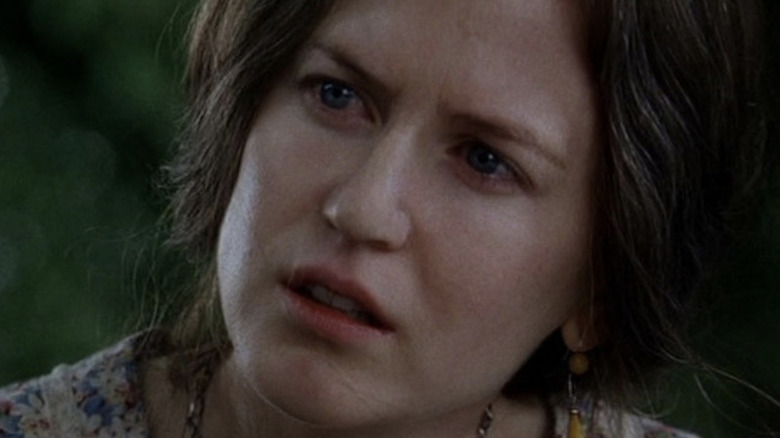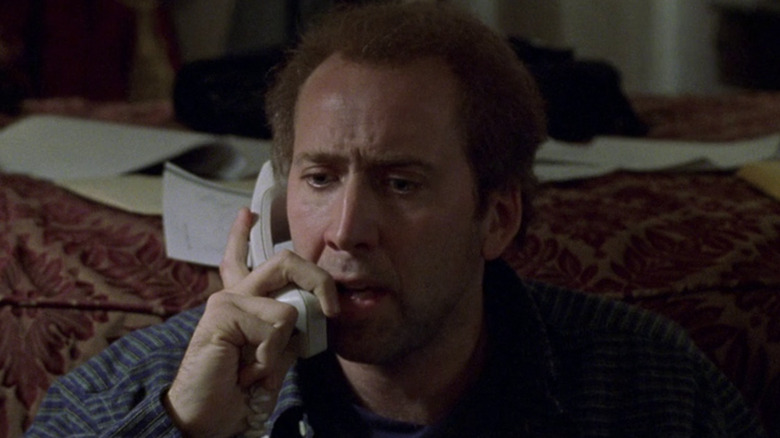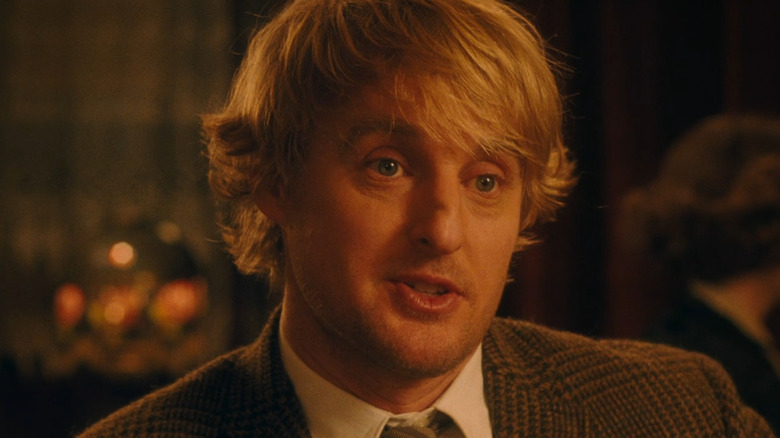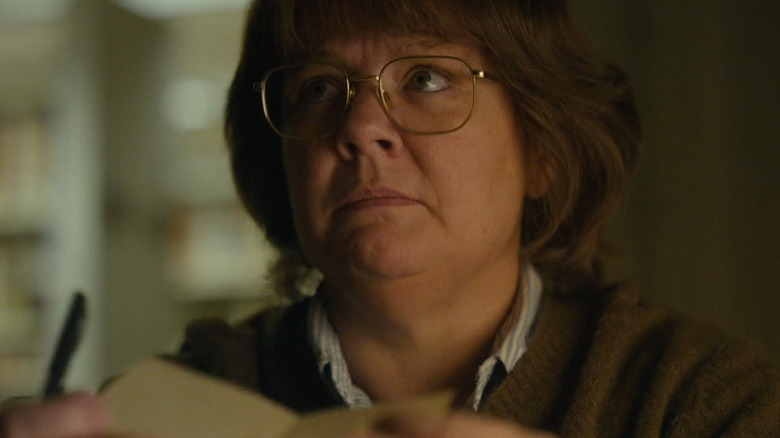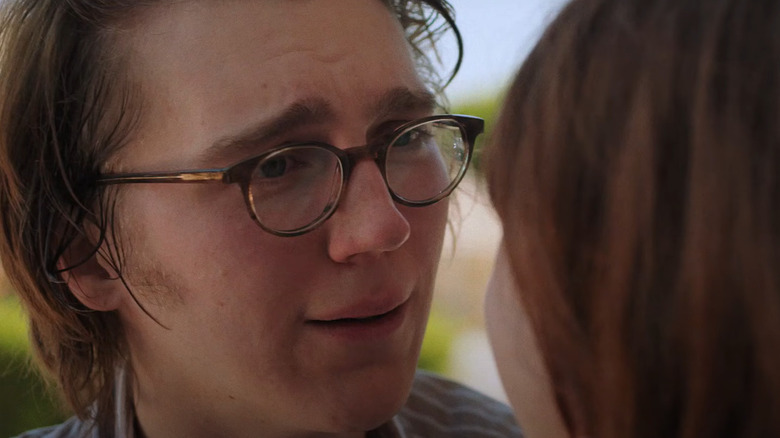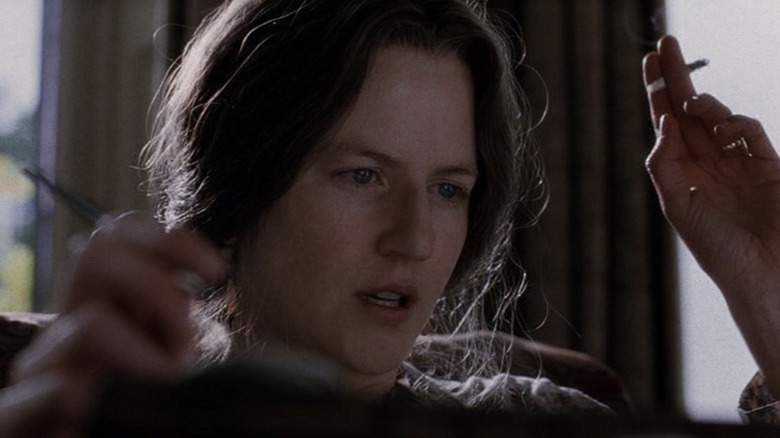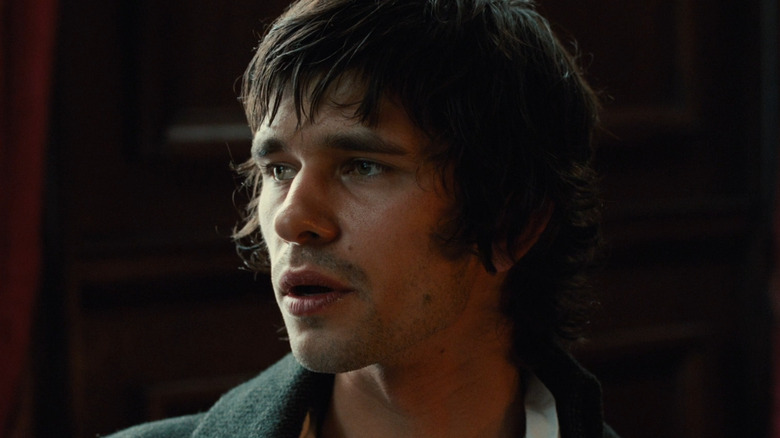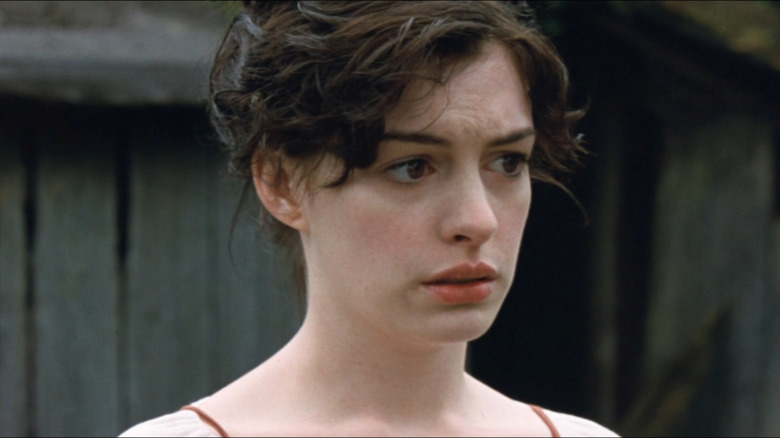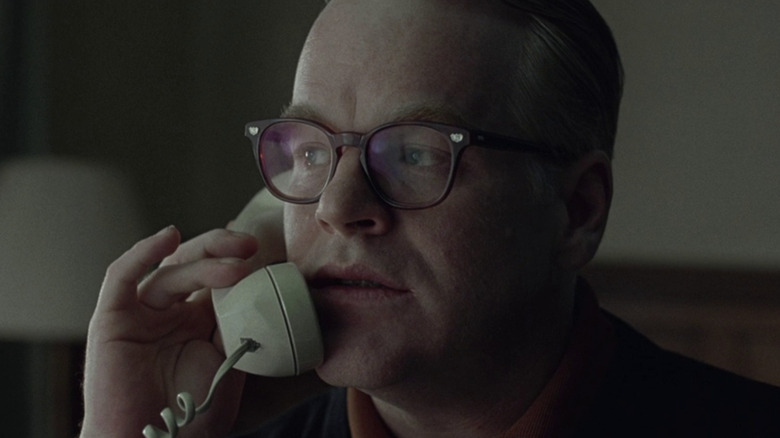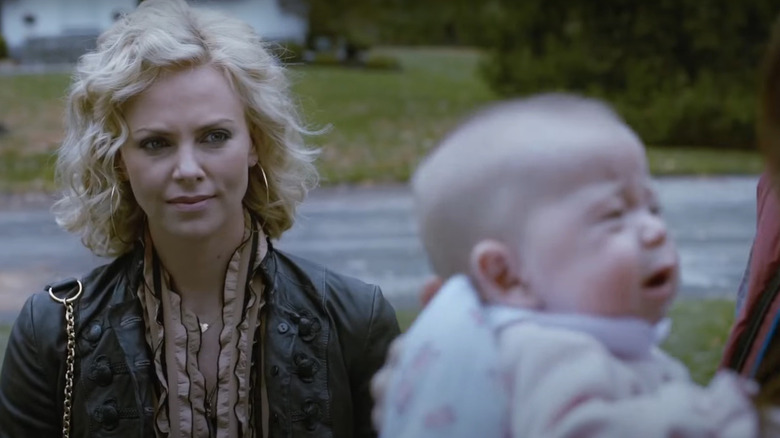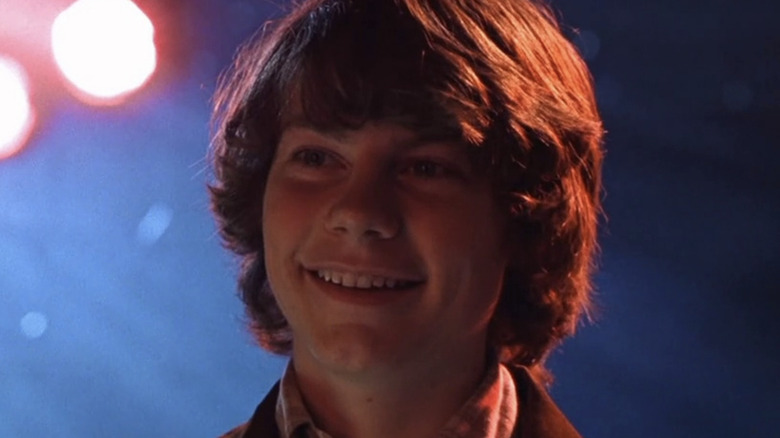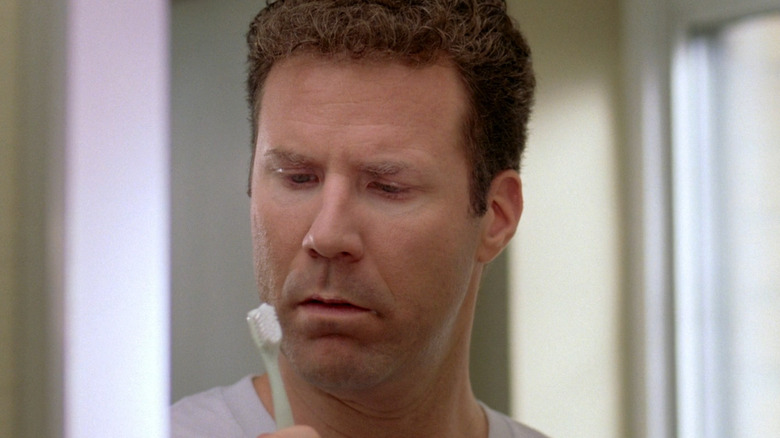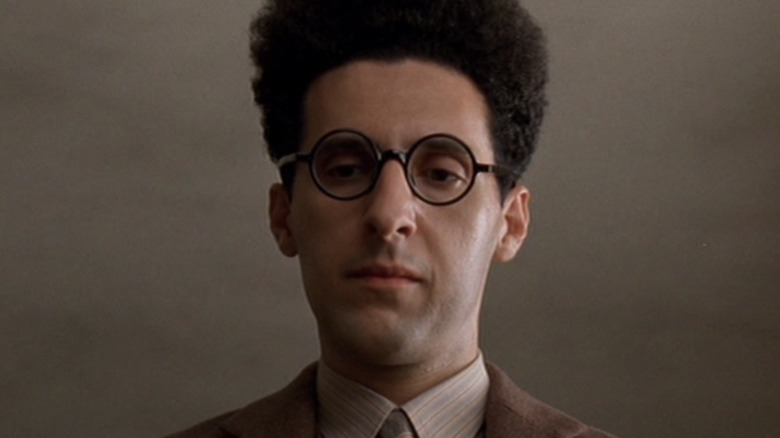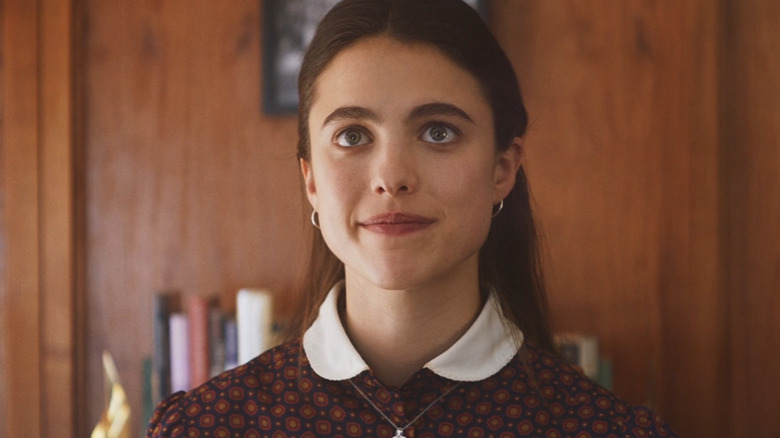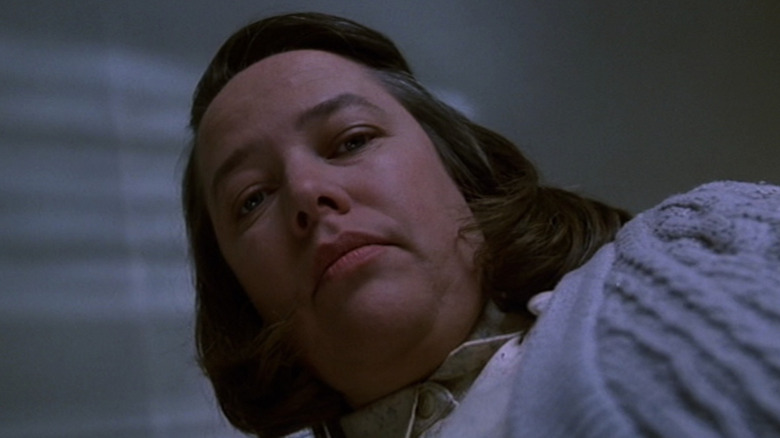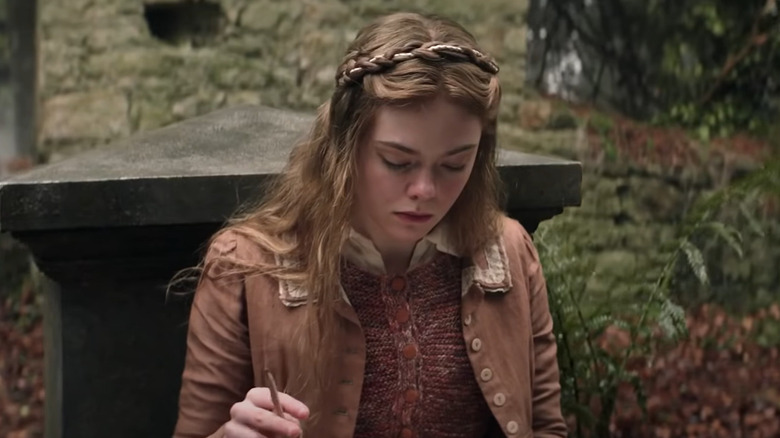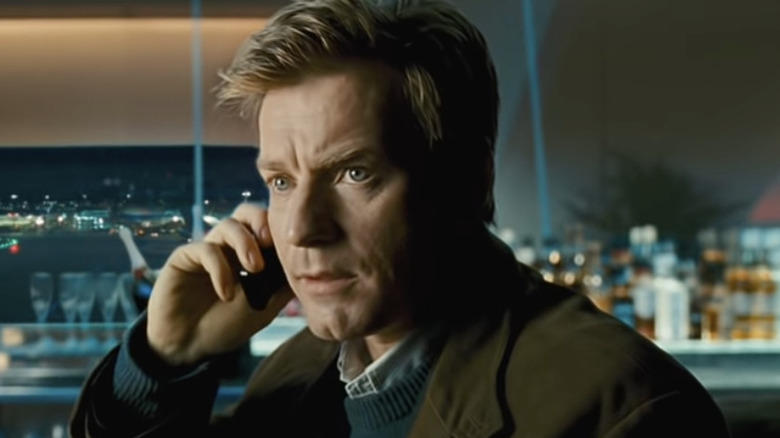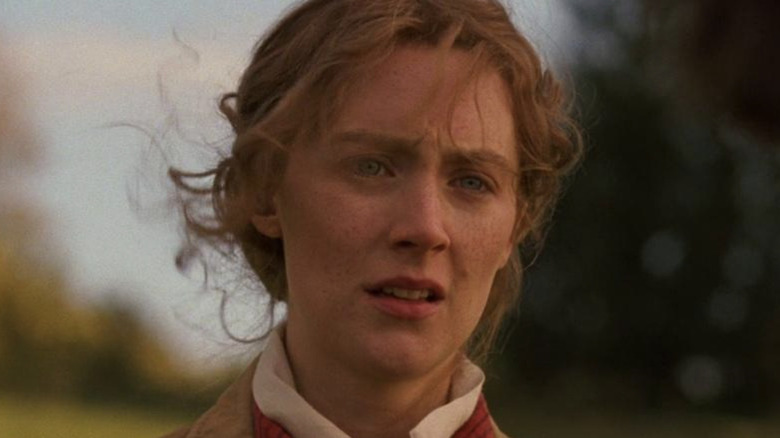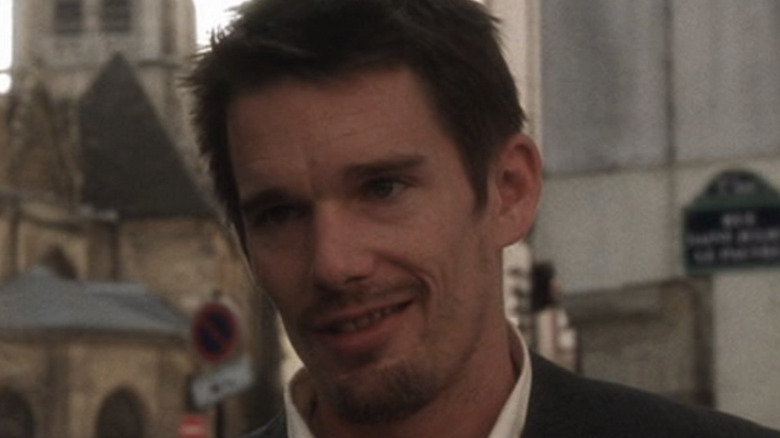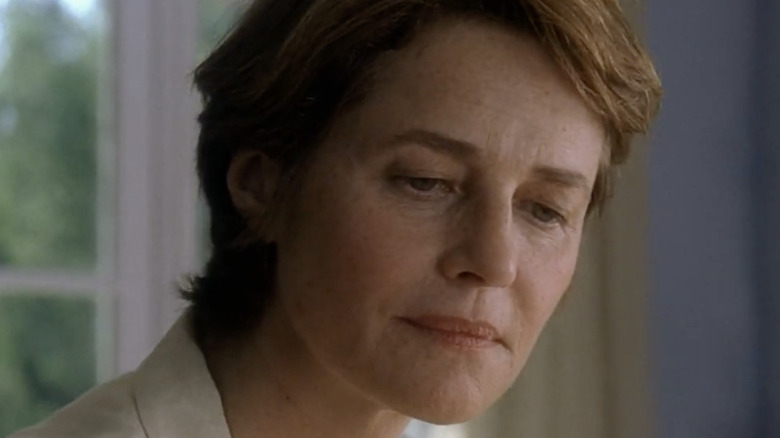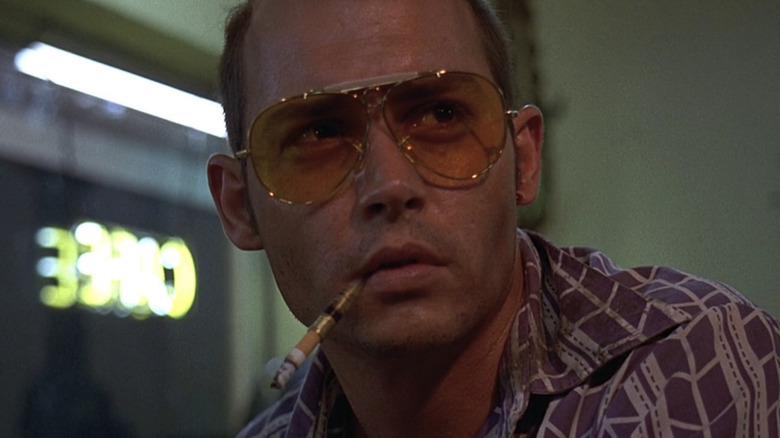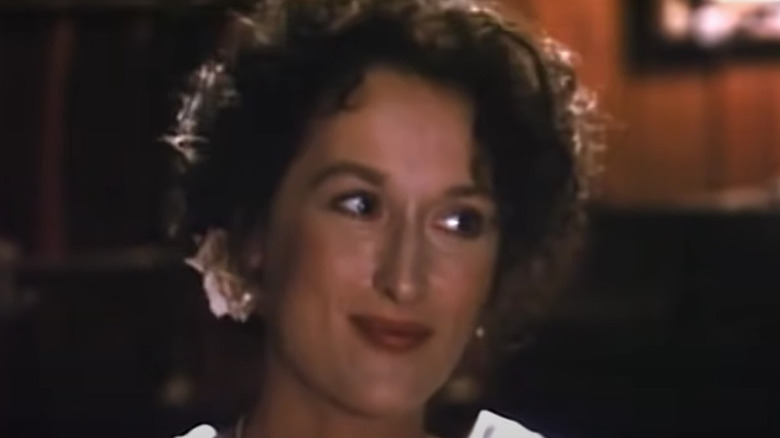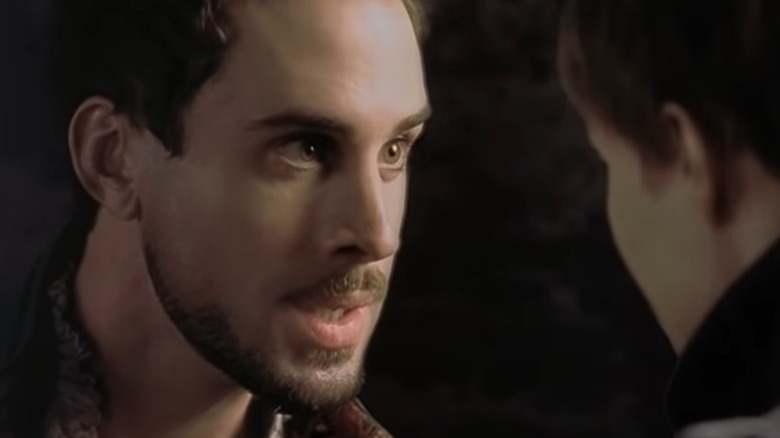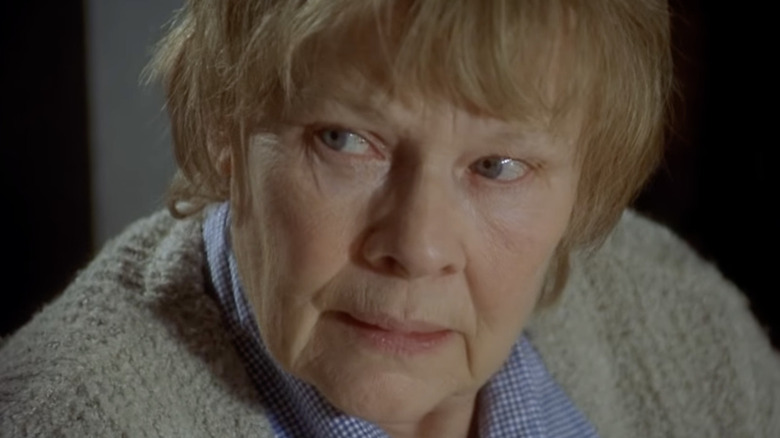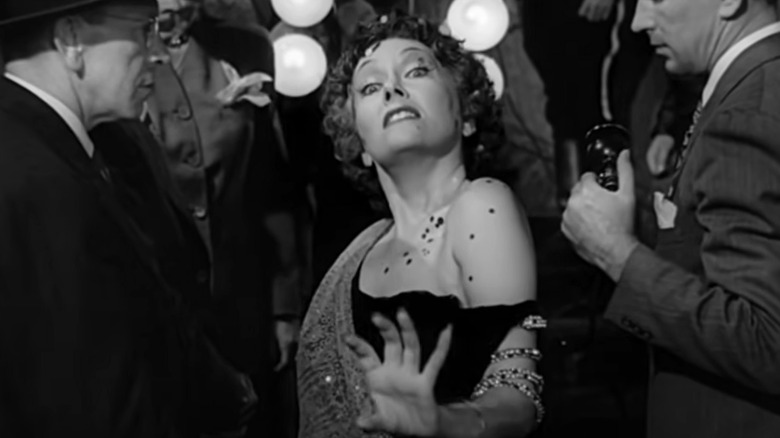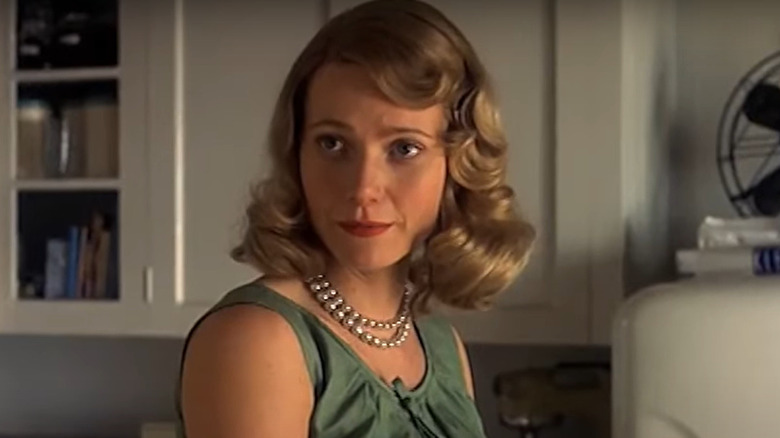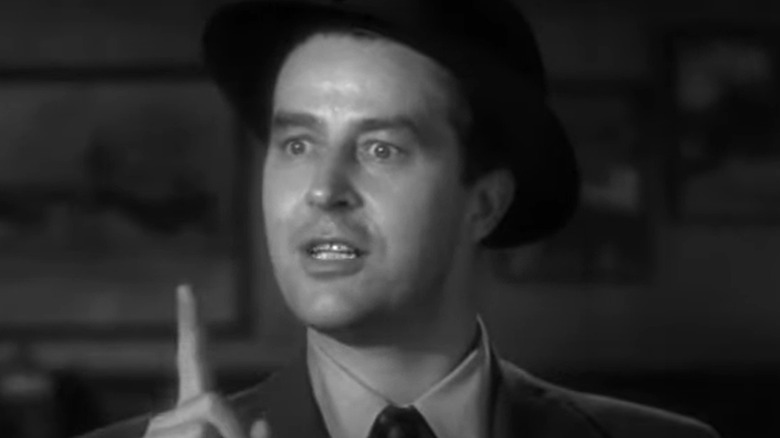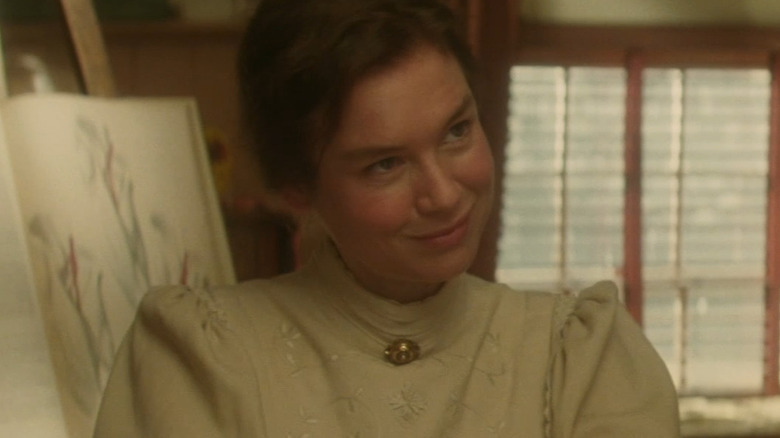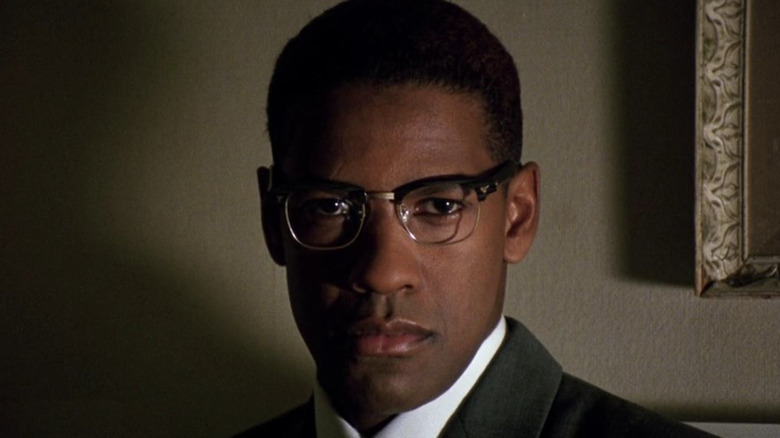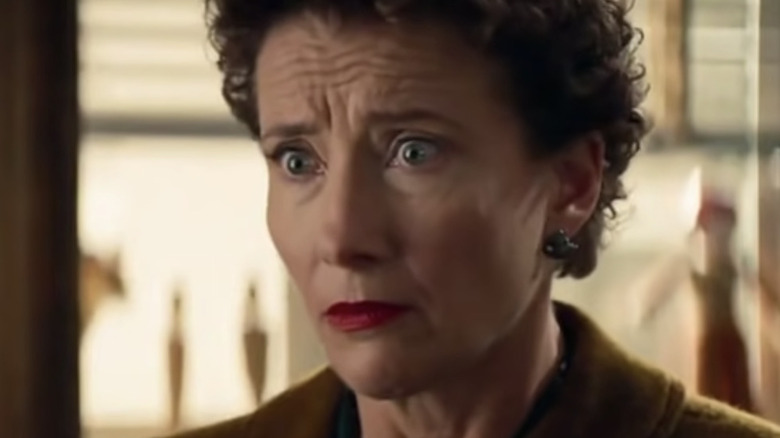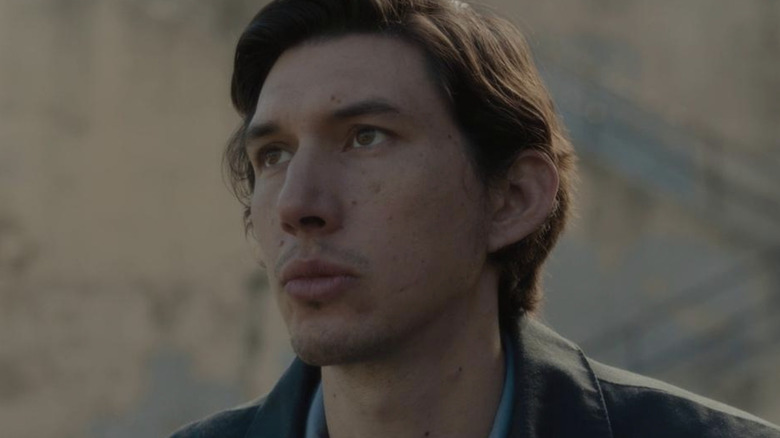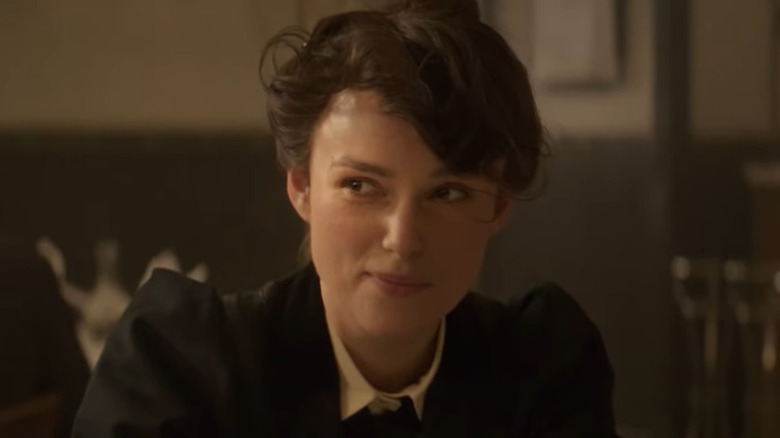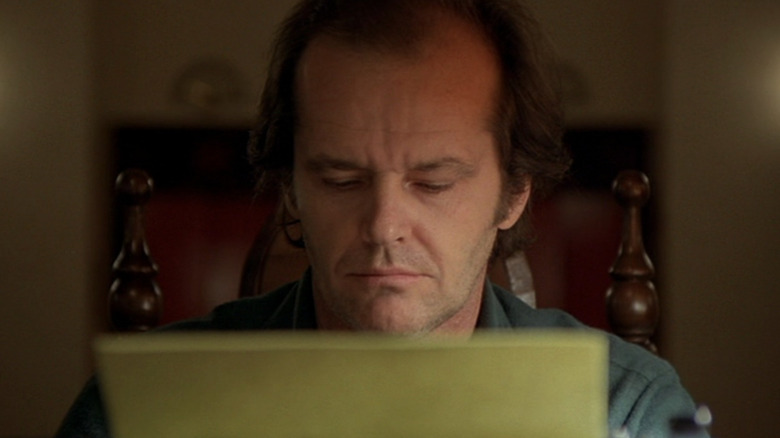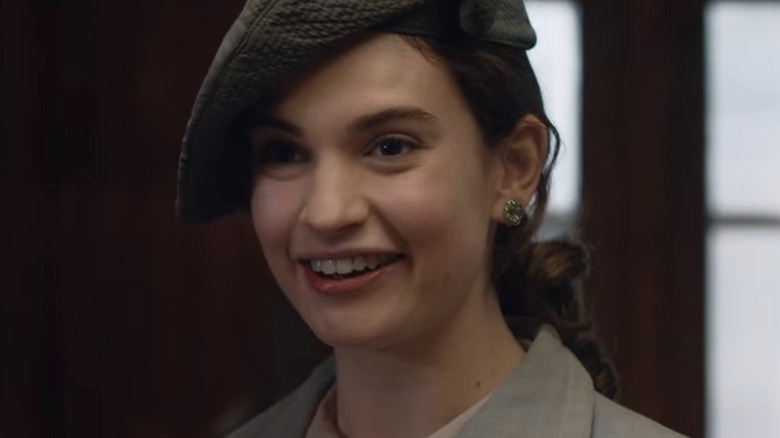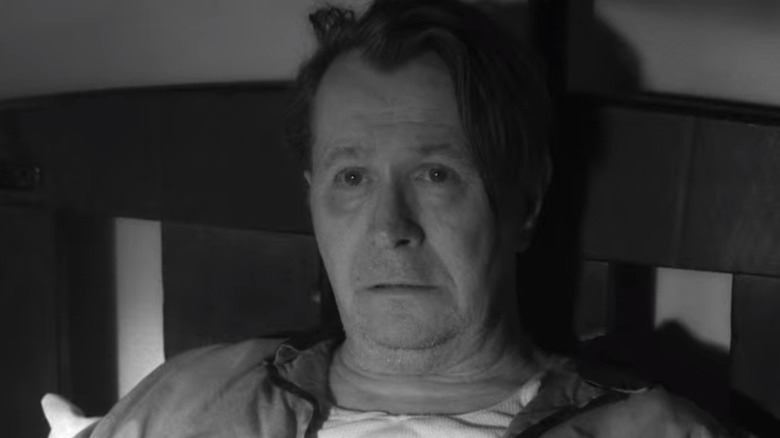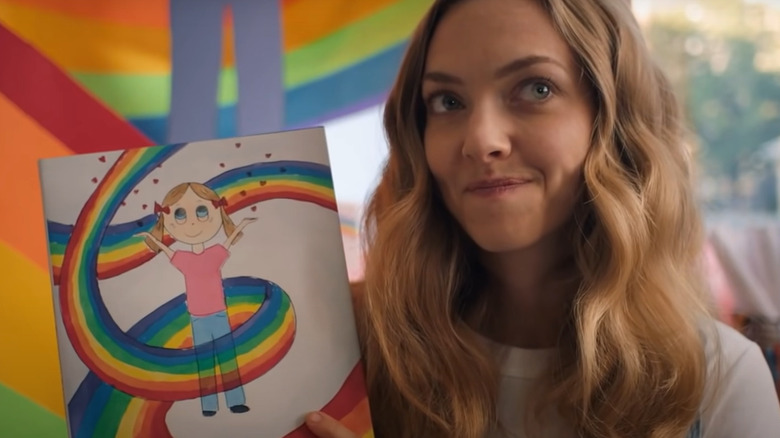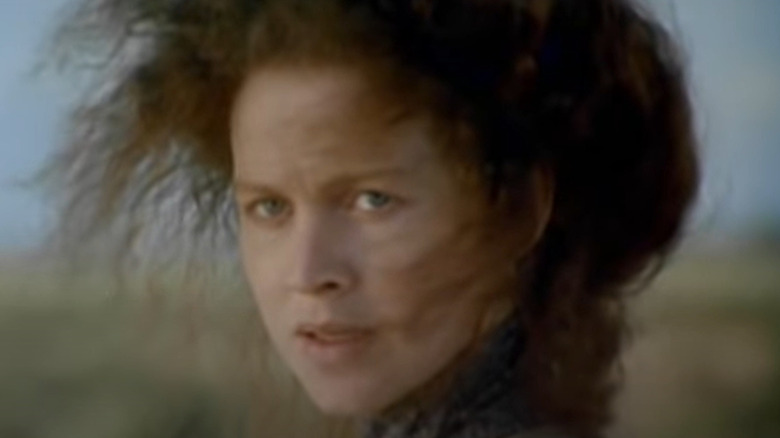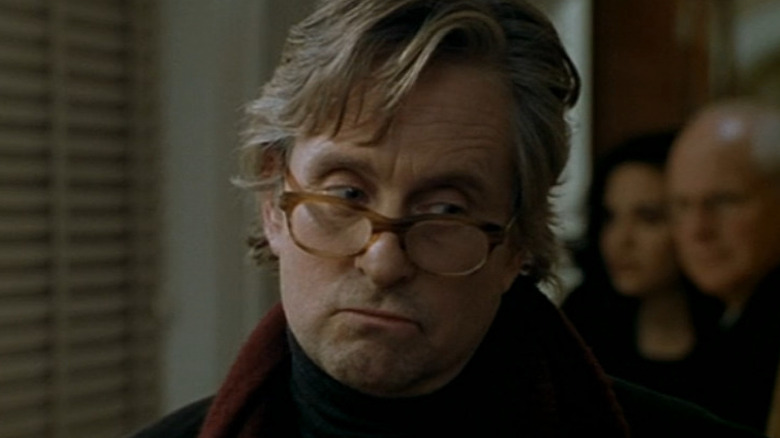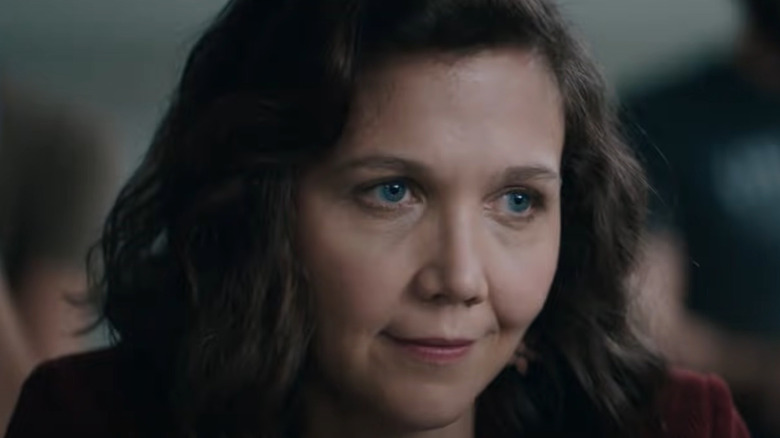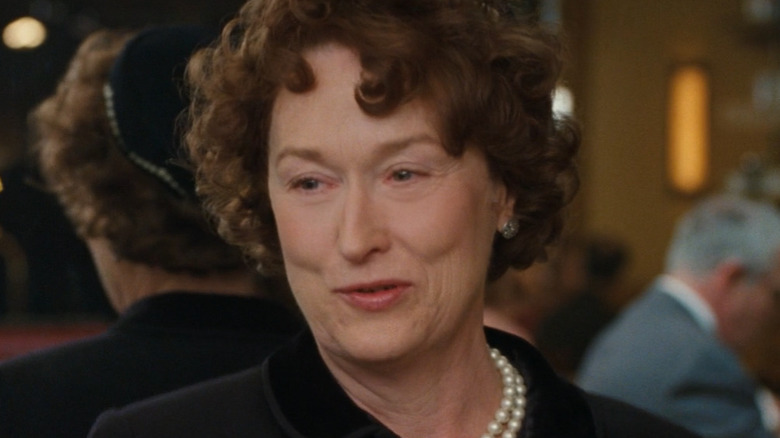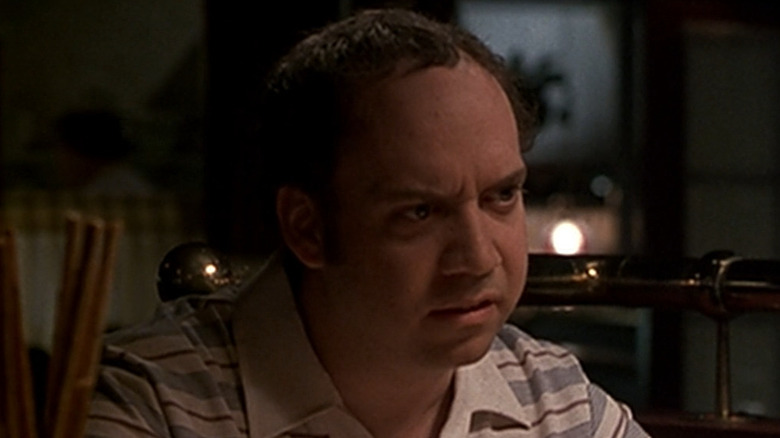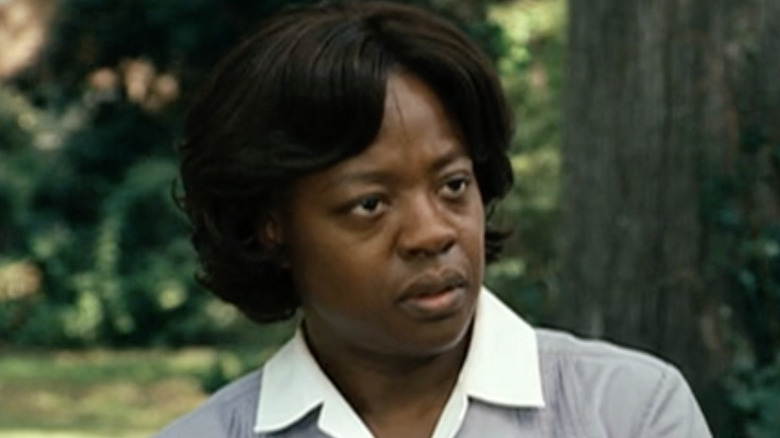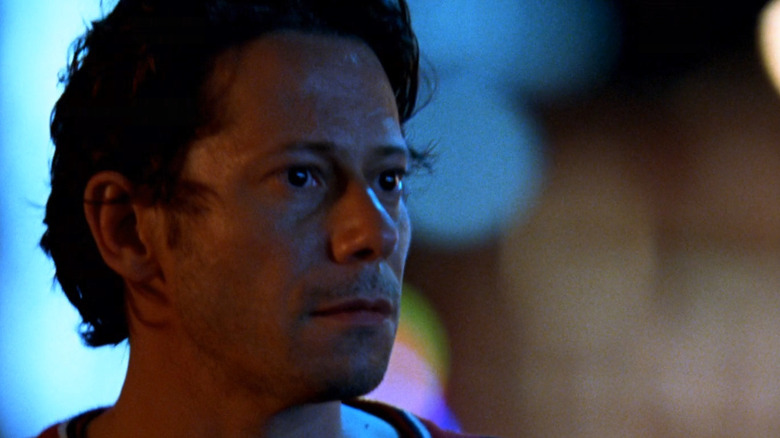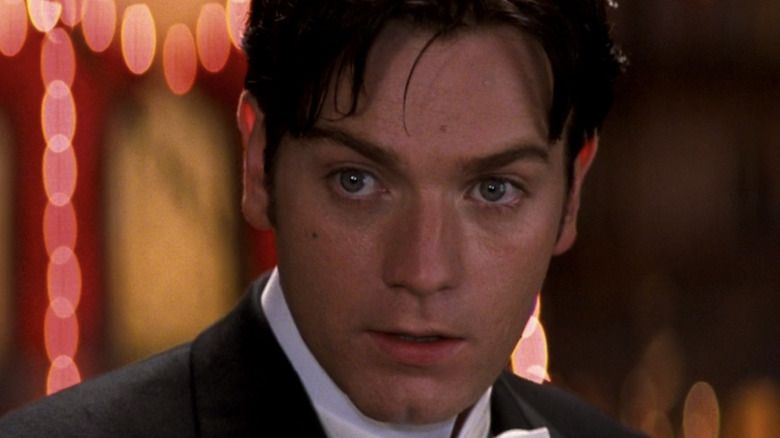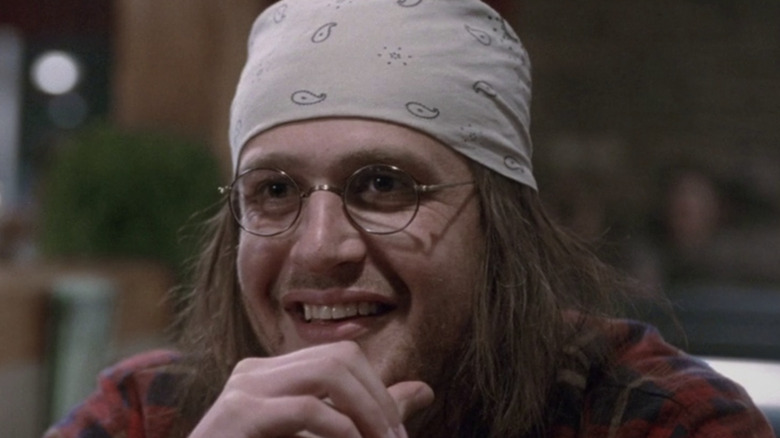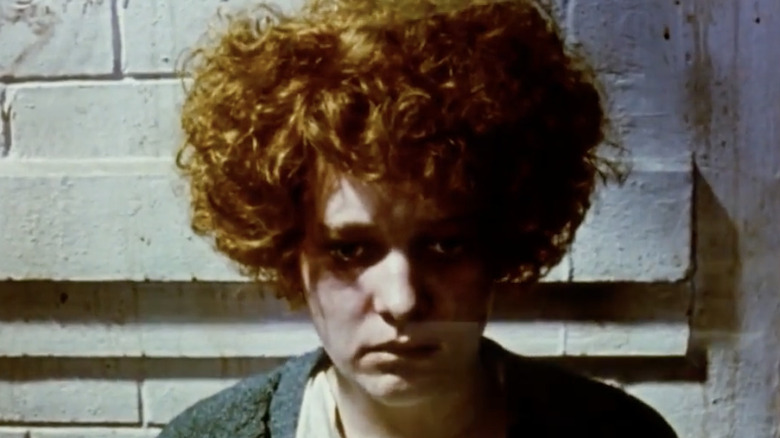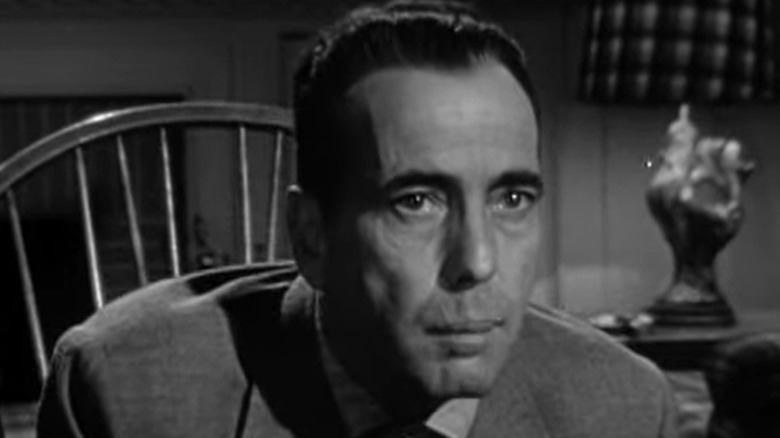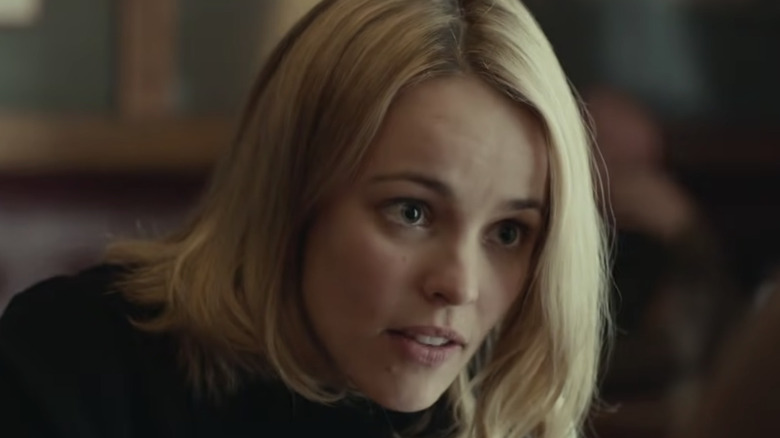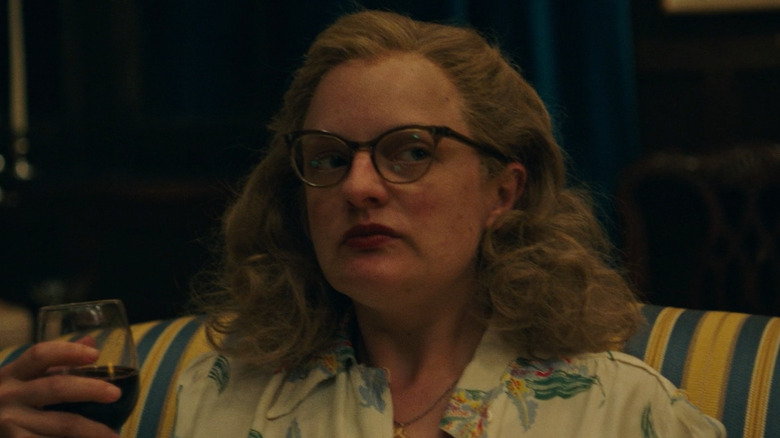50 Movies About Writers That Are Definitely Worth Your Time
From William Shakespeare to Toni Morrison to Joan Didion to J.R.R. Tolkien, it's no secret that folks who professionally put words on paper are endlessly fascinating individuals. Some writers find inspiration for their work from their own troubled lives and wild backgrounds. Others are simply born with imaginations the size of an aircraft carrier. However different they may be, authors, journalists, poets, and essayists all share the special ability of expressing themselves so well that they take up space in the minds of others.
With a gift so unique — and so fundamentally important to the movie industry — it's no wonder Hollywood loves making movies about writers. And it turns out, audiences truly enjoy watching the misadventures of the literarily inclined. However, movies about writers are all faced with the same problem: The actual act of writing is un-cinematic. There's nothing inherently that interesting about watching a person pound out sentences on a laptop or typewriter, even though the person doing the typing might be deeply interesting. Luckily, these great films have found unique and exciting ways of visualizing the writing process and the figures behind it, so read on to find out the best movies about writers (and don't worry, no one is just sitting behind a desk in any of these).
Adaptation
One of the best movies about a writer not surprisingly comes from the brain and fingertips of the meta movie master himself: Charlie Kaufman. Kaufman wrote the 2002 film "Adaptation," which tells a story about a fictional version of himself and his fictional twin brother, Donald. In "Adaptation," insecure and self-loathing screenwriter Charlie Kaufman (Nicolas Cage) suffers from writer's block, as he tries to adapt a book that seems impossible to translate to the screen. Meanwhile, his twin brother Donald (also Cage) decides that he wants to be a screenwriter too, and tries his hand at Charlie's life's work.
If a double performance from Cage isn't enough of a selling point, the fact that Kaufman wrote a movie about a screenwriter adapting a book should do the trick. In his hands, the story turns into a commentary on the Hollywood machine, the difference between reality and fiction, a semi-adaptation of Susan Orlean's real-life bestseller "The Orchid Thief," and an update of Sam Shepherd's classic stage comedy "True West."
Plus, it features a stacked supporting cast. Screen queen Meryl Streep delivers big time as author Susan Orlean, Chris Cooper serves as a perfect antagonist, and Brian Cox shows up to steal a few scenes as Robert McKee. Maggie Gyllenhaal and Tilda Swinton also appear in small roles. All of these actors bring a sense of quirky energy and make what could've been an overly heady movie into a fun ride. Viewers be warned though, anyone looking for a one-for-one recreation of "The Orchid Thief" should look elsewhere.
Midnight in Paris
Woody Allen's love letter to Paris in the 1920s is both a sweet high-concept comedy and an evaluation of the virtues of nostalgia. "Midnight in Paris" centers around Gil (Owen Wilson), a Hollywood script doctor, who dreams of writing a meaningful novel. While in Paris with his fiancée Inez (Rachel McAdams) and her parents, Gil discovers a car that takes him back to 1920s Paris at midnight. Gil goes on the trip of a lifetime, where he hangs out with literary and artistic greats like Hemingway, F. Scott Fitzgerald, Cole Porter, Salvador Dalí, Gertrude Stein, and many, many more.
"Midnight in Paris" plays like an art and literature lover's dream, as these legendary writers and artists get the chance to engage with someone who already knows their reputations and masterworks, which leads to some hilarious jokes. The casting in this film is excellent, as Tom Hiddleston proves to be an inspired choice as a young F. Scott Fitzgerald, while Adrian Brody is hilarious as a rhinoceros-obsessed Dalí. Any fan looking to get lost in a whimsical story featuring some of the most influential names of the 20th century need look no further than "Midnight in Paris."
Can You Ever Forgive Me?
2018's "Can You Ever Forgive Me?" is based on the true story of professional biographer Lee Israel (via Time). Struggling to write her next book and pay the rent, Israel (Melissa McCarthy) uses her gift for getting into the lives of other people and forges letters from all sorts of famous folks, which she sells for a high price. What ensues is a deep look inside a damaged and lonely person, who's often more comfortable embodying others rather than herself.
McCarthy — who's typically scene-stealing in comedic vehicles like "Bridesmaids" — plays against type here and brings a prickly exterior to almost every scene she's in. In her hands, Israel becomes a lovable hard drinker and sailor-mouthed depressive. But underneath the movie's pain and drama lies a quietly devastating look at an author whose talents went under-appreciated in her time. Nobody turns to fraud for fun and "Can You Ever Forgive Me?" makes a strong case that forgery really is Israel's last resort.
It also makes pains to not overly romanticize its protagonist's gifts. Even though expertly crafting false biographical correspondence is no easy feat, the audience is never explicitly rooting for Israel to get away with it. It's akin to watching a talented friend burn their skills on a fruitless enterprise and here, the viewer grows to admire Israel's work before wishing she put her efforts towards something else.
Ruby Sparks
Zoe Kazan wrote and stars in "Ruby Sparks," a film about a fictional manic pixie dream girl come to life. Author Calvin (Paul Dano) writes about a character named Ruby Sparks, and is startled to see that this person on his page suddenly appears in the form of a living, breathing Ruby Sparks (Kazan). Calvin soon discovers that his writing about Ruby holds sway over Ruby in the real world.
This high-concept plot explores heady themes like how women are objectified in fiction by male creators or what it means for an author to engage with their material once it leaves the page and enters the real world. While the movie is based around this complex metaphor, it never fails to entertain. Dano and Kazan are wonderful in the lead roles and the cast is rounded out by the likes of Antonio Banderas, Annette Benning, and Steve Coogan — who's funny enough to read a phone book.
The film got mostly positive reviews by critics, including Roger Ebert, who wrote that "the movie's intriguing in its fanciful way." Directors Jonathan Dayton and Valerie Faris of "Little Miss Sunshine" fame bring Kazan's script to life here, and anyone looking for a meta tale about writing will be sure to enjoy "Ruby Sparks."
The Hours
Virginia Woolf is an author whose work seems like it would be difficult to adapt for the big screen due to her focus on interiority, or the way that characters think and feel, which is hard to show on-screen. Luckily for Woolf fans, 2003's "The Hours" — based on a book of the same name by Michael Cunningham — heavily vibes on Woolf's "waves" length.
The movie tells the story of three women in three different time periods, who are all interconnected by Woolf's novel "Mrs. Dalloway." There's Virginia Woolf (Nicole Kidman) trying to write in 1923, Laura Brown (Julianne Moore) trying to live in 1951, and Clarissa Vaughan (Meryl Streep) trying to throw a party in 2001.
Both the film and its source material owes a ton to Woolf's classic works like "A Room of One's Own" and "Mrs. Dalloway." In "The Hours," much like in Woolf's novels, each female protagonist puts on a face for the world (and men) around her, which hides all that she has going on underneath the surface.
All three actresses shine in "The Hours," as do supporting cast members like Richard Harris in a particularly tragic performance. For anyone unfamiliar with Woolf, "The Hours" is a fantastic and emotional ode to a woman who created art at a time that didn't understand her or want her to.
Bright Star
Academy Award-winning writer-director Jane Campion brought her signature light and considered touch to 2009's "Bright Star." The film depicts the romance between poet John Keats (Ben Whishaw) and Fanny Brawne (Abbie Cornish).
Today, Keats is a well-known 19th century Romantic poet. However, in his own time, Keats felt he was a failure. His published work received mostly middling reviews and he died at 25 of tuberculosis. This context brings a tinge of sadness to the film since anybody familiar with the poet is aware of the tragic future outcome of his budding romance with Fanny.
Campion keeps a movie about a romantic rather subdued. Instead of making Keats' and Fanny's relationship into a loud ball of anachronistic erotic behavior, she spends time on the intimate moments the pair share together. The tiny beats of silence they share, the expression on Fanny's face when she receives a letter from Keats, and the moments where the pair read poetry all create a gorgeous portrait of young love. In other words, Campion captures the romance people are capable of when just being around one another is enough. However sad though it may be, this beautiful movie is quietly excellent and not to be missed.
Becoming Jane
Jane Austen received the Hollywood biopic treatment in 2007's "Becoming Jane." While the movie is not a particularly accurate account of Austen's ascendance to the literary hall of fame, it is a fun romp through Austen's past. In the film, Anne Hathaway plays the budding literary superstar, who's marked by equal intelligence and charm. As she makes her way through the world, she encounters suitors of all shapes and sizes, from all manner of backgrounds both privileged and unprivileged alike.
The movie is framed as "the inspiration" for Austen's "Pride and Prejudice." Any fan looking for a granular recreation of Austen's process or life in the Regency Era be warned — "Becoming Jane" is firmly a rom-com with biopic window dressing. Most of its plot revolves around Austen's relationship with Tom Lefroy (James McAvoy). While Lefroy existed in real life, scholars aren't certain he was ever romantically involved with the author (via The Jane Austen Centre). However, the fiction weaves into the film is more fun than issue.
"Becoming Jane" may not reveal anything particularly noteworthy about Austen or her literary process. However, it does allow Hathaway to put enough charisma on screen to fill her own novel. So, like a fun read, "Becoming Jane," entices audiences and doesn't overstay its welcome.
Capote
Some movies about authors are played for grins, while others — like 2005's "Capote" — are played deadly serious. This biopic details the six years that Truman Capote (Philip Seymour Hoffman) spends writing his magnum opus, "In Cold Blood," and the heavy toll that this work of investigating and writing about a heinous crime takes on Capote.
This book details the real-life murders of a family in Kansas, as well as the subsequent investigation into the killings, and the trial and executions of the men who committed them. In an interview with The New York Times, Capote discusses his revolutionary approach of writing this true story using the devices of fiction, which is widely credited as creating the non-fiction novel (via Brittanica.com).
The late, great Philip Seymour Hoffman captures this dark material marvelously. He completely channels the author, and won his only Oscar for the performance. While many authors have led interesting lives, not many have worked on a story that fundamentally altered the course of their life, and "Capote" captures the destructive toll of creation marvelously.
Young Adult
In 2011's "Young Adult," Mavis Gary (Charlize Theron) is a former prom queen, who's now a stunted young adult fiction writer with a penchant for bitter put-downs and whiskey. Mavis returns to her hometown and embarks upon a doomed quest to win back her old high school flame, Buddy Slade (Patrick Wilson). That Buddy is happily married with a pregnant wife doesn't deter Mavis one bit, who tries to reconnect with her old flame, all while connecting in surprising ways with Matt (Patton Oswalt), a bullied ex-classmate she barely remembers.
While "Young Adult" could have played like a depressing slice-of-life movie, in the hands of screenwriter Diablo Cody and director Jason Reitman — who team up again after the wildly successful "Juno" — it subverts expectations to become something totally unique, which has as many laughs as dark moments.
Theron shines here, as she goes for broke and swerves between unbridled nastiness and vulnerability on a dime. She's matched only by stand-up comedian Patton Oswalt, who injects a fairly grim film with a much-needed sense of humanity and empathy. In fact, Oswalt's performance is so good that Roger Ebert described it as the "key to the film's success" in his review.
Almost Famous
2000's "Almost Famous" dramatizes the actual and envy-inducing early days of director Cameron Crowe's career in music journalism (via Rolling Stone). In the movie, a teenager named William Miller (Patrick Fugit) gets hired by Rolling Stone editor Ben Fong-Torres (Terry Chen) to go on tour with a fictional band called Stillwater. Stillwater — with their long hair, sweet riffs, and infighting — acts an amalgamation of the legendary rock bands from the 1970s like Led Zeppelin and the Allman Brothers.
The movie's secret sauce is its ability to express William's passion for writing. William, like his real-life counterpart Cameron Crowe, loves rock n' roll and Crowe is able to make this enthusiasm vibrate off the screen, so viewers can reach out and grab a fistful of William's lust for life and epic experiences. Plenty of movies deal with the troubled lives of writers and many make hay of the inspirations that lead to their most influential works. However, very few films explicitly show the audience what it feels like to care about something enough to write about it for a living and do so in such a warm, sweet way. If all of that didn't sell it, "Almost Famous" also features the most iconic use of Elton John's "Tiny Dancer" of all time. Seek this movie out wherever it can be found.
Stranger Than Fiction
"Stranger Than Fiction" is a somewhat odd movie. Its director Marc Forster was previously known for sad fare like "Monster's Ball," and it stars Will Ferrell in his first real dramatic role as IRS auditor Harold Crick. Crick lives life like any everyman. He works, he chats with friends, and he pines for romance — until this existence is suddenly interrupted by a disembodied voice narrating his life. Crick goes on a quest to find the source of this narrator, and soon discovers that he's the subject of the next novel by author Karen Eiffel (Emma Thompson), who's known for killing off her protagonists.
"Stranger Than Fiction" uses its meta concept to explore the relationship between love, art, and creation, and it tackles these heady topics in a palatable and off-beat way thanks to Ferrell's turn as Harold Crick. Given the surreal nature of the story, Ferrell's acting chops fit into the movie's heightened world. In a film that dives into absurdity from its opening moments, Ferrell reveals a unique ability to reverse his usual funny man shtick. Instead of handling routine moments with absurdity, he handles absurd moments subtly. While the movie is about Harold Crick, it also relies on the relationship between Crick and Eiffel, as two people who discover the unexpected ways they influence each other. It speaks to that on a micro level as well as on a macro one, as Eiffel confronts her abilities and power as a writer, which is done perfectly in Thompson's hands.
Barton Fink
The Coen Brothers' "Barton Fink ” is a lot of things. It's a movie about writer's block — famously written during the Coen Brothers' own writer's block (via Cinephilia Beyond) — it's a showcase of John Turturro's and John Goodman's acting abilities, and it might even be an allegory for the life of the mind. However, the one thing it most definitely is, is a fantastic movie.
The story follows Turturro's Fink — a successful New York playwright concerned with the common man — when he moves to Los Angeles in 1941 to write for a major Hollywood studio. Fink is assigned to write a wrestling picture and he immediately comes down with a case of writer's block. Fink sets out to find inspiration, which inevitably leads to various bizarre only-in-a-Coen-Brothers-movie-moments.
For the unfamiliar, the Coen Brothers are riffing on a real-life frequent 20th-century practice of the literary-minded heading out to Los Angeles in search of big paychecks and fame. According to the A.V. Club, the Coen Brothers loosely based the character of Fink on the playwright-turned-screenwriter Clifford Odets. In fact, it was their discovery that Nobel Prize-winning icon William Faulkner wrote a wrestling movie — 1932's "Flesh" — that initially inspired "Barton Fink" (and the film's character of W.P. Mayhew). Faulkner and the Coen Brothers? This movie is a novel head's dream.
My Salinger Year
Joanna Rakoff's memoir "My Salinger Year ” gets the Hollywood treatment this 2021 adaptation. The movie follows Rakoff (Margaret Qualley), as she begins her writing career by becoming an assistant to literary agent Margaret Westberg. Margaret (Sigourney Weaver) is a stand-in for real life literary agent Phyllis Westberg (via Variety). Things take an interesting turn for Rakoff, when she begins taking phone calls from one of Westberg's most famous clients: J.D. "Jerry" Salinger.
"My Salinger Year" unfolds like a coming-of-age story shot through with "The Devil Wears Prada" energy. Over the course of her time working for Westberg, Joanna finds romance, renewed self-confidence in her own work, and makes decisions about where she wants her own life to go. While it doesn't have the same caustic wit that made "The Devil Wears Prada" so popular, "My Salinger Year" is most definitely an interesting snapshot into a career path most folks may not know anything about. And for any movie fan with dreams of writing, the idea of getting paid to talk to Salinger is surely catnip.
Misery
Rob Reiner adapted Stephen King's 1987 novel "Misery" into a classic horror movie of the same name in 1990. The film follows famous romance author Paul Sheldon (James Caan), who gets into a terrible car accident. He's saved by Annie Wilkes (Kathy Bates), a super fan who decides to hold her favorite author hostage. "Misery" mimics Kings real life in different ways, both superficially as it's a chilling nightmare about obsessive fans, and on a deeper level, as he's noted that it's an allegory for his cocaine addiction (via Rolling Stone).
Bates brings so much demented menace to the role that she not only makes the film, but also won an Oscar for her performance, which is extra impressive considering how infrequently horror films get recognized by the Academy. Seriously, in Bates' hand, Annie Wilkes enters the pantheon of great movie villains alongside Heath Ledger's Joker, the shark from "Jaws," and Darth Vader. For fans of the horror genre or movies about writers, run, don't walk to see "Misery." However, viewers be warned — after watching "Misery," you'll never look at a sledgehammer the same way ever again.
If you or anyone you know is struggling with addiction issues, help is available. Visit the Substance Abuse and Mental Health Services Administration website or contact SAMHSA's National Helpline at 1-800-662-HELP (4357).
Mary Shelley
Author Mary Shelley is remembered for her 1818 masterpiece "Frankenstein." While the chilling story of Dr. Frankenstein's attempt to play god and create life of his own is known to many, the details of its creator's life are likely not. So, in 2017, indie director Haifaa al-Mansour brought Shelley's miraculous and tragic life to the screen in the biopic "Mary Shelley."
The film follows a teenage Mary (Elle Fanning), who falls in love with famed Romantic poet Percy Bysshe Shelley (Douglas Booth). As she tries to navigate this relationship, Mary finds surprising inspiration for her "Frankenstein" during a night of telling ghost stories, and later struggles to get her book published.
Elle Fanning plays Shelley with the same vivaciousness she brings to her star performance as Catherine the Great on "The Great." Al-Mansour shoots the film like a romantic period piece, which makes this particular biopic unique. In reality, Mary Shelley lived through the Romantic art movement in Europe due to her relationship with Percy Shelley and friendship with Lord Byron, and her life itself is almost an inversion of a classic romance. Like typical romantic heroines, Shelley was a fiercely intelligent young woman of means, but her life did not wrap up in a neat happy ending. While she did fight her way through the period's sexist attitudes to publish arguably the greatest piece of horror fiction ever written, her life was also marked by various tragedies. "Mary Shelley" focuses on an influential moment of this authors life, and so communicates who Shelley was and her artistic achievements. For "Frankenstein" fans everywhere, it's a must see.
The Ghost Writer
In a time-honored Hollywood tradition, "The Ghost Writer" adapts another thriller by "Silence of the Lambs" author Robert Harris. Based on his novel "The Ghost," the movie follows an unnamed ghostwriter (Ewan McGregor), who's hired to complete the autobiography of former British Prime Minister Adam Lang (Pierce Brosnan). This being a Harris adaptation, it's not really a spoiler to say it's not long before the ghostwriter's assignment lands the working writer in a hot pile of intrigue.
While the movie's machinations don't move it much beyond standard political thriller fare, its cast most definitely does. McGregor is fantastic in the leading role, as is always and former James Bond Pierce Brosnan as the former PM Adam Lang, since the movie leverages Brosnan's singular charm like a weapon. All the things that made him attractive as 007 make him terrifying as a politician. The rest of the class includes some early work from the always wonderful Jon Bernthal and a superb cameo from Eli Wallach. Yes, Tuco from "The Good, the Bad, and the Ugly," shares a scene with Ewan McGregor. It's glorious.
Little Women
Greta Gerwig's 2019 "Little Women" is one of the great literary adaptations to hit the big screen. Besides the fact that it's based on one of the most beloved novels of all time (of the same name), it also features an incredible range of some of the most talented women in Hollywood.
"Little Women" the life and times of the four March sisters as they come of age, make career choices, get married, and grow up in the 19th century. Gerwig wisely decides to let the cast and Louisa May Alcott's wonderful source material do their thing. She also changes the novel's structure by moving between the "present" day (of 1868) and the past in flashbacks. However, originalists should have no fear. The flashbacks just add to the adaptation and ensure that the book's biggest moments all make it to the screen.
While "Little Women" focuses on all of the March sisters, it's Jo's story at heart, and she's played here by Saoirse Ronan. Jo is the writer of the bunch, whose imagination and creativity let her dream of a world beyond what she's told she can have. Ronan embodies Jo's free writer spirit to perfection, and her work is matched by Florence Pugh as bull-headed youngest sister Amy, Emma Watson as pragmatic eldest Meg, and Eliza Scanlen as kind-hearted Beth. The supporting cast includes Laura Dern as the girls' mother and Meryl Streep as their hilarious caustic aunt. Guided by writer-director Gerwig's confident and considerate hand, "Little Women" is a new classic in its own right.
Before Sunset
Ethan Hawke and Julie Delpy star 2004's "Before Sunset," the second entry of Richard Linklater's "Before" trilogy. Each film in the trilogy depicts a romantic rendezvous between Hawke's Jesse and Delpy's Celine and each meeting is set exactly nine years apart (via Vanity Fair). What sets this series apart is that Linklater filmed and released each movie in real-time. The first came out in 1995, the second in 2004, and the third in 2013, which gives the "Before" movies a truly authentic touch, as the characters and actors grow and age in real life.
In "Before Sunset," Jesse has just published a novel that recounts his initial meeting with Celine in "Before Sunrise." Jesse hasn't seen Celine since their meeting in the first movie and hopes the book will draw her out. It does and the pair spend "Before Sunset" rekindling their relationship, as they walk around Paris.
Jesse's novel not only ties in the events of the first film in an impactful way, but also gives the trilogy a literary bent. Linklater's "Before" trilogy can almost be viewed as a living, breathing novel set in three distinct time periods of its central characters' lives. Like the most famous romance stories — think Edith Wharton's "Age of Innocence" or Jane Austen's catalog — the "Before" trilogy is all about the ways that love both changes and holds constant over time.
Swimming Pool
"Isolated writer" movies, wherein an author goes somewhere remote to focus on working until things begin to go bump in the night, is a fantastic sub-genre and 2003's "Swimming Pool" is one of its best entries.
Author Sarah Morton (Charlotte Rampling) goes on a retreat to her publisher's remote French country home to work on her next novel. However, her peace and quiet is quickly upended when the young and enigmatic Julie (Ludivine Sagnier) shows up, claiming to be the publisher's daughter. The two women immediately butt heads, as a war of strong personalities kicks off in earnest. However, instead of turning into a clash of the generations comedy, "Swimming Pool" instead becomes a slow burn thriller.
The movie's tension is so thick, the audience can dish it out with an ice cream scooper. Every exchange between Julie and Sarah results in another layer of mystery to untangle. Every guest Julie brings by the house's pool seems to annoy and arouse Sarah's interest more and more. And every answer Sarah gets from the elusive Julie only leads to more questions. By the film's end audiences will be wringing their hands in paranoia. For fans of movies with equal parts mystery, eroticism, and writing, "Swimming Pool" is for you.
Fear and Loathing in Las Vegas
Terry Gilliam, former Monty Python member and director of oddball wonders like "Brazil" and "Time Bandits," takes audiences on a weekend getaway they won't soon forget in 1998's "Fear in Loathing in Las Vegas." Based on Hunter S. Thompson's book of the same name, the film follows writer Raoul Duke (Johnny Depp) and his attorney Dr. Gonzo (Benicio del Toro) on a trip to Las Vegas. Duke is supposed to be covering an annual motorcycle race, but he winds up taking a laundry list of drugs and tapping into "the savage heart of the American dream."
As in the book, the movie's Duke is based on countercultural icon Hunter S. Thompson, who wrote the novel out of his own experiences in Las Vegas on two separate writing assignments for Rolling Stone. The book is wonderful in its own gross, hilarious, and acid-dipped way. The movie has some difficulty transferring that plot to the big screen, since the plot is pretty thin to begin with.
However, Gilliam wisely does what he can to capture the book's energy by letting the writing speak for itself. He lifts Thompson's brilliant prose off the page and puts it on-screen in voice over, and Thompson himself is brilliantly captured by Johnny Depp, who even nails the author's unique staccato speaking style. For any movie fan who's heard the Thompson name but never read any of his work, check out "Fear and Loathing" for scenes that capture the best of his writing.
Out of Africa
1985's "Out of Africa" is a movie from a bygone era when movie stars headlined films as opposed to franchises. In other words, "Out of Africa's" selling point was the white hot charisma of Robert Redford and Meryl Streep, not its place in the Marvel Cinematic Universe. There's nothing wrong with franchise movies, but it's hard to watch a movie like "Out of Africa" and not fall in love with its leads.
Loosely on Karen von Blixen's 1937 memoir of the same name (written under her pen name of Isak Dinesen), the film follows von Blixen (Streep), as she moves to a British colony in Africa in the early 20th century and begins a doomed romance with Denys Hatton (Redford). These experiences and more shape a story that she later turns into her memoir.
The movie plays like a highlight reel of adventure romance novels. The pair has differences when they first meet, eventually learn to get along, and then learn how to really get along. Without spoiling how any of these things occur, it's no spoiler to say Redford and Streep are absolutely magnetic together on screen. Both are acting legends in their own right and together, the pair gives off enough steam to power the Trans Pacific Railroad. While writing may not always be at the forefront of the film, it definitely foregrounds the type of fun often reserved for the best beach novels.
Shakespeare in Love
For anybody who likes their romantic comedy served with a side of literary history, look no further than "Shakespeare in Love." The movie — starring Joseph Fiennes as The Bard and Gwyneth Paltrow as his love interest Viola — fictionalizes a forbidden romance between Shakespeare and a high-born lady, which inspires his next play: "Romeo and Ethel, the Pirate's Daughter." Or rather, inspires him to make some changes to it.
The movie is fun for a few reasons. The cast is clearly having a ball, Fiennes and Paltrow have fantastic chemistry, and Dame Judi Dench shows up as Queen Elizabeth I. Plus, "Shakespeare in Love" stays true to its namesake's talent by bundling low comedy, high comedy, and tragedy all into the same package. The movie was an enormous box office hit when it was released in 1998. It was a critical hit too, and won seven Oscars, including Best Picture (via IMDB). Esteemed critic Roger Ebert gave the movie four stars when it first came out and he credited the film with presenting the reason so many people fall in love with theater.
Some basic knowledge of Shakespeare's works and history will definitely help a viewer pick up on some of the movie's in-jokes. However, Shakespeare essentially wrote for anyone who's ever suffered the trials and tribulations of this mortal coil, and "Shakespeare in Love" has the same broad appeal.
Iris
The late great Iris Murdoch remains one the greatest authors of the 20th century. Her writing ran headlong into every oddity that makes humans human, and she never looked away from the quirks of our better and worse angels.
"Iris" follows Murdoch at different stages of her life, so here, Kate Winslet plays young Iris and Dame Judi Dench plays the elder Iris. For fans keeping score, that's two epic generational talents in the same movie. Iris' husband, writer and professor John Bayley, is portrayed by Hugh Bonneville and Jim Broadbent in his younger and older forms.
Ultimately, this 2001 biopic about Murdoch's life and eventual battle with Alzheimer's couldn't hope to be as original as its subject, it's certainly worth the watch to learn more about the woman behind some of the best books of the last 100 years, and who saw the world a bit differently from others. Luckily, she shared it in ways that continue to shape writers and readers alike, and "Iris" captures Murdoch's essence and influence as best it can.
Sunset Boulevard
"Sunset Boulevard" is an all-time classic film. Set in 1950s Hollywood, the movie follows Joe Gillis (William Holden), a down-on-his-luck screenwriter, who's out of work and out of credit. Gillis hides from repo-men in what appears to be an abandoned palatial estate on Sunset Boulevard. However, he discovers the residence is actually home to reclusive actress Norma Desmond (Gloria Swanson). Desmond was a big star in the silent era and wants Holden to help her write a comeback movie.
"Sunset Boulevard" is a one-of-a-kind love letter to the Golden Age of Tinseltown. For starters, it was directed and co-written by Billy Wilder, who was arguably one of the best talents of the era (if not all eras) and wrote classics like "Ace in the Hole," "The Apartment," and "Some Like It Hot." The writing of the film is fantastic, as it examines Hollywood and screenwriting itself through a sharp and satirical lens. Its commentary on the film industry runs deep, as it looks at the studio system and in particular, the silent era.
In some meta casting, the role of Norma Desmond is played by real-life silent starlet Gloria Swanson, whose film career was resurrected thanks to her Oscar-nominated turn in this stunning performance. The movie also features cameos from the likes of Cecille B. DeMille, Buster Keaton, and Erich von Stronheim. "Sunset Boulevard" is a truly iconic movie and shouldn't be missed.
Sylvia
Sylvia Plath gets brought to life in 2003's "Sylvia," which focuses on the life of one of the most influential American writers to ever put pen to paper. Sylvia (Gwyneth Paltrow) is studying at Cambridge, where she explores her writing and finds love in the form of the poet Ted Hughes (Daniel Craig). The two marry, but Sylvia struggles with depression and her writing career, all while taking care of her family.
Paltrow does a lot with a role that could have fallen into clichés by imbuing Plath with a warmth that makes her tragic suicide even more devastating, even though anybody familiar with Plath's story or work knows how it ends. "Sylvia" doesn't connect Plath's death directly to her work, but rather explores the deep sadness that she lived with her whole life, which informed her worldview. Come for more information about Plath herself, stay for Paltrow's performance, and leave with the knowledge that Plath still lives on in her beautiful grasp of language.
If you or anyone you know is having suicidal thoughts, please call the National Suicide Prevention Lifeline at 1-800-273-TALK (8255).
If you or someone you know needs help with mental health, please contact the Crisis Text Line by texting HOME to 741741, call the National Alliance on Mental Illness helpline at 1-800-950-NAMI (6264), or visit the National Institute of Mental Health website.
The Lost Weekend
Writer-director Billy Wilder makes the list again with his 1945 adaptation Charles R. Jackson's novel of the same name, "The Lost Weekend." The movie follows the harrowing misadventures of alcoholic writer Don Birham (Ray Milland). Over the course of a single weekend, Birham begs, steals, and hits rock bottom in his search of another drink.
At the time, "The Lost Weekend" was one of the first stories to deal with the dark realities of alcoholism in American theaters (via FilmSite). Thankfully, in Wilder's capable hands, the movie avoids diving into the exploitation deep end that is common in so many addiction narratives. Instead, Birham's addiction is treated with consideration and nuance and gets shown with warts and all.
Considering so many writers, including the author of "The Lost Weekend" (via The NY Times), have contended with alcoholism and other addictions, it's refreshing to see a movie where the affliction is not romanticized. The Academy agreed as well. "The Lost Weekend" received Oscar wins for its director, screenplay, lead actor, and won the year's Best Picture award. While "The Lost Weekend," is by no means a light watch, it's certainly worth the weight of its heavy subject.
If you or anyone you know is struggling with addiction issues, help is available. Visit the Substance Abuse and Mental Health Services Administration website or contact SAMHSA's National Helpline at 1-800-662-HELP (4357).
Miss Potter
For many, "The Tale of Peter Rabbit" is one the greatest children's books ever written and its imagery is recognizable the world over. In 2007, director Chris Noonan brought the story of the woman who created Peter Rabbit to the big screen with "Miss Potter." Beatrix Potter (Renée Zellweger) is an unconventional woman in the early 1900s: She is unmarried, and she dreams of writing a children's book based on her drawings of animals. Everything changes when she meets Norman (Ewan McGregor), a kind man who wants to publish her book, and with his help, Beatrix challenges a world that only sees women in the most limited light.
In the movie, Zellweger plays Beatrix Potter with a blend of quiet confidence and kind words. She is as sweet as Mary Poppins in the title role, but the movie's true creative stroke is the way it portrays Potter engaging with her creations, who spring to life on the page with lovely animated sequences.
The brief inclusion of animation in a live action film goes a long way. It both reminds audiences of the impact of a story as seemingly simple as "The Tale of Peter Rabbit," and also illustrates just how powerful Potter's imagination really was. She had an incredible gift for storytelling, and "Miss Potter" shows how the sexist attitudes of her time almost prevented this gift from ever reaching the world. In the end, "Miss Potter" shows how belief — in oneself and in others — can be stronger than societal demands, and for anyone looking to get lost in pastoral Victorian England with a beloved author and her characters, "Miss Potter" is the film for you.
Malcom X
Spike Lee's "Malcolm X" tells the story of one of the most literally and figuratively revolutionary writers of all time. The movie follows Malcolm X (Denzel Washington) in a cradle-to-grave narrative, beginning with his childhood in Harlem as Malcolm Little and going into his prison time, in which he's reborn as Malcolm X.
The movie is a lot of things — entertaining, interesting, educational — but it's a showcase for Washington and Lee's indelible talents first and foremost. As the movie progresses deeper into Malcolm X's work and teachings for Black liberation and civil rights, Lee's direction gets more confidently stylized. The same goes for Washington's performance. It's almost as if the two men purposefully paced their originality on-screen to line up with the stages of Malcolm's life.
While Malcolm X's only published work is his autobiography, his verse lives on through recordings and republished speeches. Unlike the majority of the other existing writers on this list, Malcolm didn't write fiction or craft stories. However, the impact of his work has arguably had the most to say about life in America, which is just one of many reasons why Spike Lee's "Malcom X" is an appointment viewing.
Saving Mr. Banks
"Saving Mr. Banks" recounts Walt Disney's efforts to woo author P.L. Travers to grant Disney the movie rights to her work. The work in question? The practically perfect-in-every-way "Mary Poppins." The movie's conflict revolves around Travers' (Emma Thompson) reluctance to let Walt Disney (Tom Hanks) turn her creation into a candy-coated Disney vehicle. The story is based on the real life production of "Mary Poppins." However, publications like Vulture pointed out that this film excludes a number of things from the true story and in doing so, warps what happened. This makes sense considering Disney Studios released "Saving Mr. Banks," likely had to ensure the story fit their company's squeaky clean brand.
That said, "Saving Mr. Banks" is still a worthwhile watch for fans of Traver's books, the movie adaptation of "Mary Poppins," or both. It delves into the differences between her book and the movie, and it also explores Traver's childhood as an inspiration for the original. Most interestingly, however, "Saving Mr. Banks" depicts a story about an author losing control over the work they put out into the world. It may have too neat an ending for some folks' taste, but it's still an interesting question for a movie to address nonetheless.
Paterson
Director Jim Jarmusch's "Paterson" is a love letter to folks who find beauty in things like taking the bus or having a beer at the same bar every night of the week, and is a must-watch for the poetically inclined. Paterson (Adam Driver) lives and drives a city bus in Paterson, New Jersey. Paterson is a kind and quirky man, who's also a wonderful poet. There's not much more to the plot than that: Poetry, routine, and the occasional disruption of that routine.
While this may not sound like much of a story, Jarmusch is a master at communicating feelings. "Paterson" features lush sound design — like the distinct sound of a spoon hitting a cereal bowl in this scene — and marvelously composed shots that capture the granular details of each object in their frames. In other words, Jarmusch takes a movie about a poet and turns it into his own visual poetry.
"Paterson" is a beautiful movie to behold and its subtly meticulous crafting rewards multiple re-watches. Plus, the poetry in the film was written by established poet Ron Padgett (via PBS NewsHour). It's an excellent showcase of the American author's work and lends the film a sense of authenticity that not many other movies about fictional artists have.
Colette
Set at the end of the 19th century, the 2018 biopic "Colette" charts the rise to prominence of the French female writing phenom Sidonie-Gabrielle Colette (Keira Knightly), as well as her abusive relationship with her husband and publisher Henry Gauthier-Villars a.k.a. "Willy" (Dominic West).
For the unfamiliar, Colette penned a popular series of French novels about a teenager named Claudine, as she comes of age in France. The novels were largely based on Colette's own life and were enormously popular with young women upon release. However, Colette's husband took credit for her work and originally published the Claudine novel with his name on them (via TIME). It's probably not too much of a spoiler to say that Colette and Willy eventually divorced.
How Colette eventually gets credit for her own novels is the driving conflict of the film — so we won't spoil that information here with more historical facts. Finding out how she did it in "Colette" is definitely worth any fan's time. Critic Nell Minnow writes for Roger Ebert that Knightley "gives one of her best performances as a girl with spirit and talent who becomes a woman with ferocity and a voice." Knightly and West ooze chemistry — even when they're furious with one another — and the whole movie is a sultry affair about an author, who lived the way she wanted and eventually got the credit for writing the way she wanted too. Cheers to you sister.
The Shining
Stanley Kubrick's 1980 classic "The Shining" is not only perhaps the best of the "isolated writer" movie sub genre, but for many, it's one of the best horror movies of all time. Based on the novel of the same name by Stephen King, "The Shining" sees failed writer Jack Torrance (Jack Nicholson) move his family into the remote Overlook Hotel for the winter. Torrance takes a job as the hotel's winter keeper as a means to find peace, quiet, and money, while he attempts to write his novel. This being a King story, things in the Overlook Hotel take a turn for the supernatural fairly quickly. This being a Kubrick movie, the scarier things take a turn for the striking as they appear on screen.
It's hard to stress the impact of "The Shining" enough. The 1970s were marked by grizzly low-budget exploitation horror films like "The Last House on the Left" and the iconic "Texas Chain Saw Massacre," and "The Shining" kicked off the new decade like a behemoth nobody asked for or understood. At the time of its release, the movie was widely critically dismissed and even Stephen King panned it (via IndieWire).
However, time has been kind to "The Shining." Today, the fingerprints of "The Shining" are everywhere. Its score, cinematography, and classic lines are endlessly honored, parodied, and copied in everything from contemporary horror movies to episodes of "The Simpsons." In cultural currency, "The Shining's" credit is more than "fine" — it's a perfect 850.
The Guernsey Literary & Potato Peel Pie Society
"The Guernsey Literary and Potato Peel Pie Society" is an early 20th century romantic drama with a dash of modern sensibilities and a great admiration for the power of book clubs. Based on Mary Ann Shaffer and Annie Barrows' book of the same name, the WWII-era film follows author Juliet Ashton (Lily James) on her writing assignment to the island of Guernsey. It's 1945 and Juliet travels to a small British Channel isle to investigate its book club, "The Guernsey Literary & Potato Peel Pie Society," which is rumored to have been founded under Nazi occupation. Once Juliet arrives, she discovers intrigue, book lovers, and the dashing Dawsey Adams (Michiel Huisman).
While its plot is a tad predictable — Juliet is engaged before she embarks on her journey but that Mr. Adams is so handsome and charming that she may have to call her wedding off — the movie serves as a sweet love letter to literary fans. The story revels in the connection strangers find over their shared passion for great works of art. Anybody who's ever joined a book club or even an online fandom will appreciate "The Guernsey Literary & Potato Peel Society" for what it is: a familiar conversation for friends of the genre. Books don't always need to be big unwieldy challenging works; sometimes they just need to offer comfort to their readers. Luckily, Juliet and the rest of the "Potato Peel Society" offer comfort in spades.
Mank
Gary Oldman stars in a wonderful performance as the man who penned "Citizen Kane” in David Fincher's 2020 biopic "Mank." The movie centers around writer Herman Mankiewicz (Oldman) a.k.a. "Mank" and the drama surrounding the creation of arguably the best movie of all time. Most of this drama stems from the screenwriter himself. Mank is too smart for his own good. When he's not being over-served in bars, he's a hair's breath away from insulting whichever benefactor is bankrolling his good time. Whether it's titan of industry William Randolph Hearst (Charles Dance) or "Citizen Kane ” star and director Orson Welles (Tom Burke), nobody is safe from Mank's biting wit.
Director David Fincher also uses the movie to shine a light on an odd period of Hollywood history. The movie mirrors the structure of "Citizen Kane:" It unfolds in a series of moments (some fictionalized according to Vulture), which Fincher argues likely impacted the final script that Mank handed over to Wells. In doing so, the movie dives into early 20th century American politics and the idea that Hollywood has acted as a political machine since its inception.
It's all very heady stuff. It's also all complicated by the feud between Welles and Mank over who really wrote which part of the screenplay. In fact, movie critic Pauline Kael first raised the issue in her 1971 essay "Raising Kane." The debate around contribution to the screenplay has since continued, but one thing's for sure: "Mank" is a fantastic film about movies and the people who write them.
A Mouthful of Air
Based on the 2003 novel of the same name by Amy Koppelman — who also wrote and directed the film — "A Mouthful of Air" explores the realities of living with postpartum depression. Julie (Amanda Seyfried) is a new mom and children's book author, who attempts suicide. The movie then explores Julie's day-to-day life of trying to balance her depression against her various personal and professional responsibilities.
Koppelman's various works have all dealt with mental health issues in different forms and her experience in depicting the topic in a thoughtful and multi-dimensional way shines through in "A Mouthful of Air." While the film's critical reception was mixed, critic Nick Schager pointed out that the movie's strongest element "is its refusal to propose a one-to-one explanation" for depression in his review for Variety.
"A Mouthful of Air" tackles its tough subject with an abundance of empathy. It also features a strong central performance from Seyfried, whose inner feelings and conflicts are at odds with what the outside world sees: a woman who "has it all" and writes books that help readers confront their fears. "A Mouthful of Air" is not easy to get through. However, Koppelman's efforts resist exploitative tropes and create a story about understanding and the potential for healing.
If you or anyone you know is having suicidal thoughts, please call the National Suicide Prevention LiLifeline by dialing 988 or by calling 1-800-273-TALK (8255).
My Brilliant Career
1979's "My Brilliant Career" is about an aspiring author named Sybylla Melvyn (Judy Davis) and highlights the not-so-glamorous part of the life of the aspiring writer in late 19th century Australia. Sybylla lives on a farm, where she dreams of being a writer, although her parents see this as just a flight of fancy. Unable to afford the cost of her care, they ship her off to live with her wealthy grandmother, where Sybylla experiences love, a world outside of what she knows, and the means of making her dreams come true.
What sets "My Brilliant Career" apart from similar stories of young adults confronted by the unrelenting reality of responsibility is its refusal to look away from Sybylla's faults. She's bright and creative, yes, but like everybody, she's flawed. It's a truly fantastic character portrait that's definitely worth a watch. Audiences at the time agreed too. "My Brilliant Career" won 6 Australian Film Institute awards in 1979 including Best Film and Best Actress for Judy Davis' performance.
Wonder Boys
Based on Michael Chabon's 1995 novel of the same name, 2000's "Wonder Boys" follows Professor Grady Tripp (Michael Douglas) over the course of a few eventful days. Tripp wrote a successful novel some time ago, but in the present, his wife has left him and he passes his time getting high and teaching creative writing. Tripp is stuck with writer's block, but a weekend with two of his students Hannah (Katie Holmes) and James (Tobey Maguire) helps him find the story that he needs to tell.
When the movie was released, it was met with great reviews from critics. Roger Ebert gave the movie four stars and felt Michael Douglas gave a career stand-out performance as Tripp. Douglas is usually enough reason to see any movie, but "Wonder Boys" also features fantastic turns from then upcoming stars like Toby Maguire and Katie Holmes. Francis McDormand also brings her singular personality to the movie as Tripp's love interest, and there's even a wonderful part for Rip Torn as an aging and mysterious writer named "Q."
A movie that's made with as much care as "Wonder Boys" shouldn't go unnoticed. Most folks who've spent time in a creative writing class will enjoy the movie's specificity; movie fans who haven't will simply enjoy the ride.
The Kindergarten Teacher
"The Kindergarten Teacher” is a pitch-black look at the pain of feeling like you have something to say but don't have the talent to say it well. The 2018 movie is a remake of a 2014 Israeli film of the same name and centers on Lisa (Maggie Gyllenhaal), an aspiring poet-turned-kindergarten teacher. Lisa is not a particularly good poet, but one of her students shows promise as a writer. Following in a long line of misguided anti-heroes, Lisa goes to extreme lengths to attempt to foster her student's talent.
Not surprisingly, Gyllenhaal is fantastic in this role, which Rolling Stone movie critic Peter Travers called a "new career peak" for the actress, who "[compels] us to understand a woman who maybe doesn't understand herself." Viewers be warned: "The Kindergarten Teacher ” is capital "D" Dark. Not since Salieri in "Amadeus" has a character so singularly captured the despair of a person coming to terms with their artistic limitations. It's an unfair fact of life that everybody isn't a genius. However, after "The Kindergarten Teacher,” the audience might feel blessed that at least they're better at coping with that reality than Ms. Lisa.
Sideways
The bachelor party movie is a time-honored tradition in Hollywood. Most generations have their definitive version and some outings in the sub-genre even include Tom Hanks. Meanwhile, other takes like "Sideways" are helmed by director Alexander Payne, who seems to thrive on stories about human behavior that most audiences wish didn't exist.
Miles (Paul Giamatti) and Jack (Thomas Hayden Church) are two old college buddies, who set off to California's wine country for Jack's bachelor party. Miles is a broke divorced writer with a finished manuscript that he's afraid to let anyone read and a drinking problem. Jack is a small-time actor, who's marrying for money and looking for a few more illicit affairs before he gets married and his good looks fade away entirely. Neither man is happy and neither man is what you might call a good person. For example, Miles robs his mother to pay for the trip and Jack beds a wine server early on in the trip.
Admittedly, none of this sounds like a good time. However, Payne shines a light on average folks at their worst in a way that can make everybody laugh at just how low human beings can go. "Sideways," like the 2004 novel it was based on, is side-splittingly funny. It also has a ton to say about wine, relationships, and things that inspire people to take big swings, like finally dusting off that old manuscript and letting someone read it.
Julie & Julia
Hungry viewers beware, "Julie & Julia” puts a bevy of famous chef Julia Child's signature dishes on screen and will make anyone who watches come down with a searing case of hunger. Julie Powell (Amy Adams) is an aspiring author, who's feeling a bit directionless. So, Julie decides to make all 524 dishes from Child's cookbook "The Art of French Cooking" in a year and keep a blog of this massive effort. At the same time, the film follows Julia Child (Meryl Streep) in the years before she becomes a world-renowned chef, when she is just an American in Paris, who enrolls in French cooking school. The film cuts back and forth between Julie and Julia, as each woman faces her own seemingly endless well of challenges in pursuit of her goals of self-discovery, and sharing that self with the world.
Based on two true stories, "Julia & Julia" draws from Julia Child's autobiography "My Life in France," as well as Julie Powell's memoir "Julia & Julia: My Year of Cooking Dangerously," which was the book that Powell published thanks to the popularity of her blog (via Variety). Both Adams and Streep are marvelous actors in their own right, but it shouldn't be a surprise to hear "Julie & Julia" is very much Streep's vehicle. Her performance as Child plays like a loving tribute to a larger-than-life personality, who brought French cuisine to homes across the United States and world. This was the final film of writer-director Nora Ephron, and her assured hand plus the work of Streep and Adams all bring an infectious energy that is almost guaranteed to leave a smile on viewers' faces.
American Splendor
2003's "American Splendor" is all about the intersection of fact and fiction. The movie is based on a long-running comic series of the same name, which itself is based on the life of its author Harvey Pekar. The real-life Pekar narrates the film, while his on-screen counterpart is portrayed by Paul Giamatti.
While all of this may sound overly complex for a movie about a comic book writer, it's very in line with the spirit of "American Splendor." Unlike "Batman" or "X-Men" comics, Pekar is no superhero. In fact, his comics are very honest about what he is: a file clerk with a few ex-wives, who lives in Cleveland. This honesty is part of what makes his work so engaging. It also makes the movie a fairly unabashed look into the life and times of a very unique creator.
From the highs and lows of Pekar's moderate fame to his bout with cancer, "American Splendor" pulls no punches in covering its subject, which works considering its author never pulled any punches about himself either. The movie's style — a hybrid of documentary interviews with the real life Pekar and well-executed dramatic recreations with Giamatti as Pekar — place the film firmly in the indie category. However, its experimental style shouldn't be considered a barrier to entry. Much like its creator, "American Splendor" is shaggy and weird, but it's got a ton of heart.
The Help
2011's film adaptation of Kathryn Stockett's 2009 novel "The Help" was not only a smash hit with audiences, but also introduced a wide array of film viewers to the talents of Viola Davis and Octavia Spencer.
"The Help" is set during the early 1960s in the South, and kicks off in earnest when Eugenia "Skeeter" Phelan (Emma Stone), a young aspiring writer, returns home from college. Since leaving home, Skeeter has discovered a new way of seeing things, and finds that she's deeply uncomfortable with the way that white families in her hometown treat their Black maids. Skeeter begins interviewing domestic workers Aibileen (Viola Davis) and Minny (Octavia Spencer) in an effort to tell their side of the story. Soon, Skeeter's work causes trouble among the racist white community, particularly once the maids begin to demand better treatment from their employers.
Both the movie and novel have been widely criticized for centering the voices of its white characters. Davis herself told The New York Times in an interview that she regretted her role in the film because "it wasn't the voices of the maids that were heard." So, in respect to Ms. Davis, appreciate "The Help ” for making her and actress Octavia Spencer household names since they are both seriously fantastic in this movie, but don't come to "The Help" for a detailed or thoughtful exploration on race relations in America.
The Diving Bell & The Butterfly
"The Diving Bell & The Butterfly" is the incredible true story of one writer's ability to dictate his entire memoir through a series of blinks after suffering a stroke. Jean-Dominique Bauby (Mathiew Amalric) is the French editor of the fashion magazine Elle. He's got a high-flying job, a loving family, and everything going for him until he suddenly has a stroke and wakes up to discover he has "locked-in syndrome." Jean-Dominque is almost entirely paralyzed, but his mental capacities remain as they were before, so he decides to write a book about his life.
Based on Bauby's 1997 memoir of the same name, "The Diving Bell & the Butterfly" deals with a subject matter that is often wildly moving and sometimes hopelessly upsetting. However, director Julian Schnabel deftly keeps the movie from falling into utter despair. It goes without saying, but anybody who can dictate an entire book just by blinking one eye to a speech therapist was born with an indomitable human spirit. It's this spirit and unbelievable energy that Schnabel, Amalric, and company bring to the screen. Come for the story's enrapturing hook and stay for a deep dive into a writer's soul.
Moulin Rouge!
Few people make movies like Baz Luhrmann. The director's more is more approach to filmmaking has produced visually striking movies like "The Great Gatsby” and "Romeo + Juliet," which are difficult to compare to much else and his 2001 musical "Moulin Rouge!" is no exception.
"Moulin Rouge!" follows Christian (Ewan McGregor), a young writer who sets off to find artistic fame and fortune with the Bohemian movement in turn of the century Paris. Christian doesn't find those things, but he does find an impassioned love affair at the Moulin Rouge with a theater singer and courtesan named Satine (Nicole Kidman). However, their love must be kept secret from the man who can save the Moulin Rouge from bankruptcy, but will only do so if he can have Satine all to himself.
This plot may sound clichéd, but Luhrmann's gift is to take clichés and infuse them with colors, movement, and set design so loud that any unoriginality is immediately drowned out by its fantastic surroundings. Plus, "Moulin Rouge!" is a jukebox musical. So, while there are a few original songs written for the movie, Luhrmann also repurposes anachronistic popular songs for this 1900 setting, like The Police's "Roxanne." The audience sees this world through naïve writer Christian's eyes, as he finally experiences love, a subject that he'd written about but never known for himself. Like the best airport romance novels, "Moulin Rouge!" turns the ridiculous into a great time.
The End of the Tour
David Foster Wallace's seminal talent dominated the American literary field throughout the '90s. Chances are anybody who hasn't read his work has heard a portion of his famous "This is Water" speech or perhaps has some ideas about the type of guy who lionizes Wallace, as Deirdre Coyle describes in "Men Explain David Foster Wallace to Me" for Electric Lit. With all of that reputation preceding him, 2015's "The End of the Tour" is faced with the Herculean task of bringing Wallace from an idea into an intimate, human form.
Based on a true story, the movie is framed around a days-long interview in 1996 between Wallace (Jason Segel) and Rolling Stone contributor David Lipsky (Jesse Eisenberg). Lipsky accompanies Wallace on the last leg of his book tour for "Infinite Jest," and gets a surprising insight into the writer's life, at the moment when Wallace's life changes forever.
In reality, Lipsky wrote about this time with Wallace for Rolling Stone, which Lipsky later turned into his memoir "Although Of Course You End Up Becoming Yourself." The memoir is the basis for "The End of the Tour," which is about two strangers connecting. Both Segel and Eisenberg are fantastic in this movie that's entirely carried by their ongoing riveting conversation. The movie isn't without its faults, as writer and former friend of Wallace Glenn Kenny wrote for The Guardian that "it gets everything wrong" about the writer. While the movie's not perfect, it's an interesting attempt to portray a singular artist on screen.
An Angel at My Table
Internationally renowned New Zealand author Janet Frame takes center stage in Jane Campion's 1991 biopic "An Angel at My Table." The film draws from the author's three autobiographies for its story: "To the Is-Land," "An Angel at My Table," and "The Envoy from Mirror City." Each book takes place in a different stage in the author's life and the movie follows suit with Alexia Keogh, Karen Fergusson, and Kerry Fox playing Frame in her childhood, teenage, and adult years. "An Angel at My Table" begins with Frame's childhood growing up in an impoverished household. In adolescence, she gets institutionalized for a misdiagnosis of schizophrenia, and finally finds fame on the page in adulthood.
With such a bevy of rich material to pull from, it's no surprise this movie is fantastic. It also doesn't hurt that it's directed by Oscar-winning director Jane Campion, whose characteristic empathy for her subjects radiates through "An Angel at My Table." In Roger Ebert's review, he says the movie gives "great attention to human detail." As usual, Mr. Ebert is dead-on. Campion does away with typical biopic clichés by simply focusing on the movie's one-of-a-kind protagonist and tell Frame's life story, which combines horror, perseverance, and brilliance.
In a Lonely Place
Humphrey Bogart does his noir thing in the 1950 classic "In a Lonely Place." Dixon "Dix" Steele (Bogart) tries to clear his name in a murder investigation, but it turns out, he has more problems than just being a murder suspect. He's a screenwriter who hasn't sold anything in a few years, his experience in WWII has left him prone to flights of rage, and he's not sure if his best girl actually wants to go through with their engagement.
Saying anything else ruins what makes film noir so special: the twists and turns. However, it's no spoiler to say that this is a classic of the genre. The movie is based on a novel of the same title by Dorothy B. Hughes. It was directed by studio system stalwart Nicholas Ray. Bogart's love interest and co-star in "In A Lonely Place" is played by Gloria Grahame Hallward, who brings a fantastic sense of "been there, done that" energy on screen that makes the movie that much more interesting. While this may be the oldest film on the list, it's not to be missed. They really, truly don't make 'em like this anymore.
Spotlight
"Spotlight" is named after the investigative team at The Boston Globe, and masterfully follows the newspaper's real 2002 investigation into allegations of child sexual abuse and systemic cover-ups within the Boston Catholic Church. This work won a Pulitzer Prize for The Boston Globe and set off a reckoning within the Catholic Church.
The movie — featuring a cast that includes Michael Keaton, Rachel McAdams, Mark Ruffalo, Stanley Tucci, and Liev Schrieber — is a masterclass in focusing on details. Director Tom McCarthy zeroes on the minutiae of investigative journalism. It captures everything from pouring over personnel files to interviewing victims to waiting for records to be made public to beating down doors to get answers. The actors are all fantastic from top to bottom and everybody gets a moment to shine.
While the movie is not entirely without moments of very loud, very righteous indignation, for the most part, it trades fireworks for the facts of the real investigation. It's a wise choice that highlights the impact that hard-nosed local journalism can still have on the world at large, which is partly what makes it one of the greatest movies about journalists ever. For many, it's the 21st century's "All the President's Men." If all that wasn't enough to convince anybody to check it out, it also won Oscars for Best Picture and Best Original Screenplay in 2016.
Shirley
Elisabeth Moss gives a powerhouse performance in "Shirley," which adapts Susan Scarf Merrell's 2014 novel of the same. Like the book, the movie tells a fictionalized story about famed horror author Shirley Jackson. For the unfamiliar, Jackson's works include the novel "The Haunting of Hill House" and the short story "The Lottery." Her writing is terrifying and claustrophobic in equal measure. Jackson was a master at saying the quiet part out loud and could turn social anxiety into a reason to hide under the bed.
The movie follows a fictional couple, who move in with Jackson (Elisabeth Moss) and her husband Stanley Edgar Hyman (Michael Stuhlbarg), and are quickly brought into the strange and surprising world of Shirley Jackson. This framing of the story around outsiders who are brought into Jackson's home allows the audience to see various sides of the writer and her precarious approach to life. It also gives Moss the opportunity to put on an absolute show. Moss is never not fantastic but this role of Shirley Jackson gives her the opportunity to be mean, wounded, drunk, empathetic, brilliant, and anxious, all within the same scene. It should be in the conversation for some of her best work. Moss stans and horror fans, do yourselves a favor by putting "Shirley" on the top of your queue.
